Haiyore! Nyaruko-san W Episode 7 References
(0:09 - 0:39)
The lines at this time go as follows:
「青春時代が夢だったなんて、後からほのぼの思わないように、アバンチュールを楽しみましょうよ!」This is referencing lines from the lyrics to "Seishun Jidai" (青春時代), "Youthful Days", a song performed by Morita Kouichi with Topgallant (森田公一とトップギャラン) and released in 1976.S2 The original lines go as follows:
「次は私とニャル子が青春時代の真ん中を楽しむ番」
「胸にトゲぶっ刺しますよ!」
"Seishun jidai ga yume datta nante, ato kara honobono omowanai you ni, abanchuuru wo tanoshimimashou yo!"
"Tsugi ha watashi to Nyaruko ga seishun jidai no mannaka wo tanoshimu ban"
"Mune ni toge bussashimasu yo!"
"So we don't faintly recall our youthful days as just a dream, let's enjoy some romantic adventures!"
"Next is our turn to enjoy our youthful days"
"I'll stab your heart with thorns!"
「青春時代が夢なんて あとからほのぼの思うもの」
「青春時代のまん中は 胸にとげさすことばかり」
"Seishun jidai ga yume nante ato kara honobono omou mono"
"Seishun jidai no mannaka ha mune ni toge sasu koto bakari"
"Youthful days are just a dream, things to faintly recall afterwards"
"Youthful days are full of things that stab your heart with thorns"
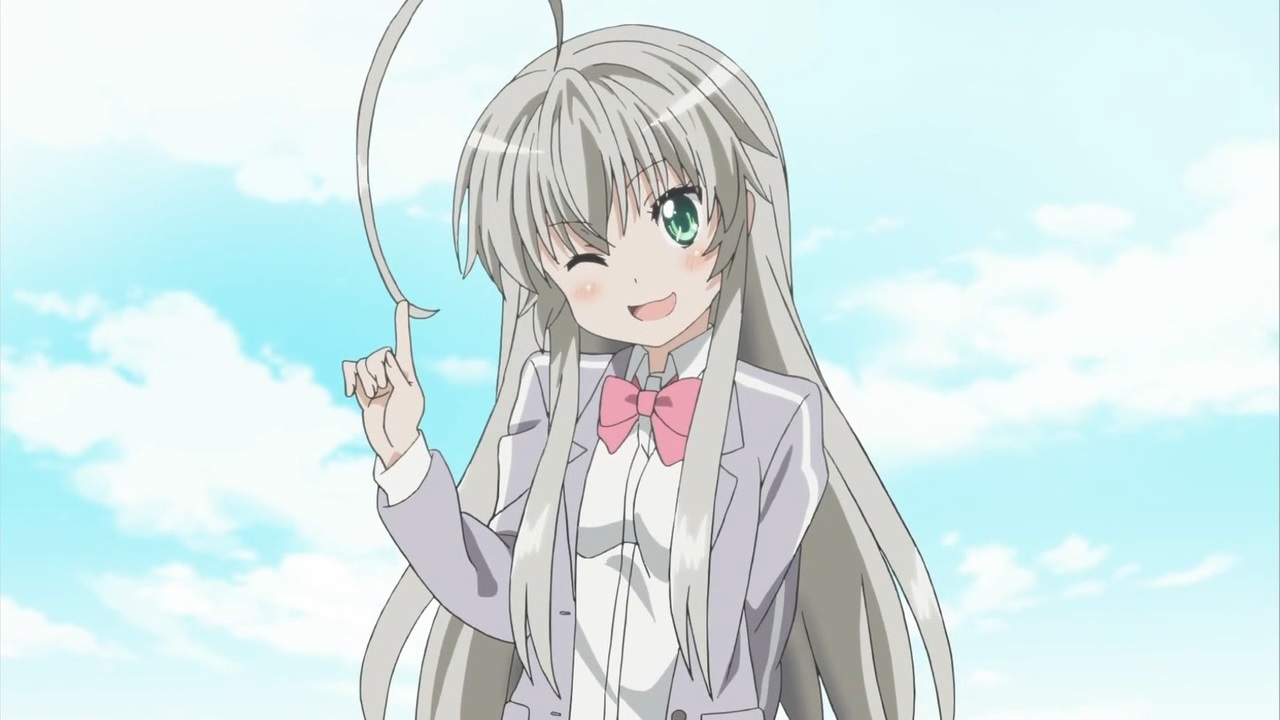
"I love you!" (0:27)
The Japanese line is "Daisuki!" (ダイスキ!). This is referencing "DAISUKI!" (ダイスキ!), a Japanese variety show that aired from 1991 to 2000.S2 During the show, before each commercial break a brief eyecatch video is played in which someone will face the camera and say "Daisuki!". Videos for reference:
https://youtu.be/Lontom8xokQ?t=1063
https://www.youtube.com/watch?v=Egy3ykJJw8Y
https://www.youtube.com/watch?v=URKDKdXG7Rw
"Around this time, Cthune must have become a wanderer in the gap of the Super Dimensional Fortress." (1:06)
The phrase "Chou jikuu na Yousai" (超時空な要塞), "Super Dimensional Fortress", is referencing "Chou Jikuu Yousai Makurosu" (超時空要塞マクロス), "Super Dimension Fortress Macross", an anime series that aired from 1982 to 1983.
(0:41)
The line at this time goes as follows:
「愛!ニャル子と二人。二人の為に世界はある。」This is referencing lines in the lyrics to "Sekai ha Futari no Tame ni" (世界は二人のために), "The World Exists for Us", a song sung by Sagara Naomi (佐良直美) and released in 1967.S2 The original lines go as follows:
"Ai! Nyaruko to futari. Futari no tame ni sekai ha aru."
"Love! Nyaruko and Me. The world exists for us."
「愛 あなたと二人」
「二人のため 世界はあるの」
"Ai anata to futari"
"Futari no tame sekai ha aru no"
"Love, you and me"
"The world exists for us"
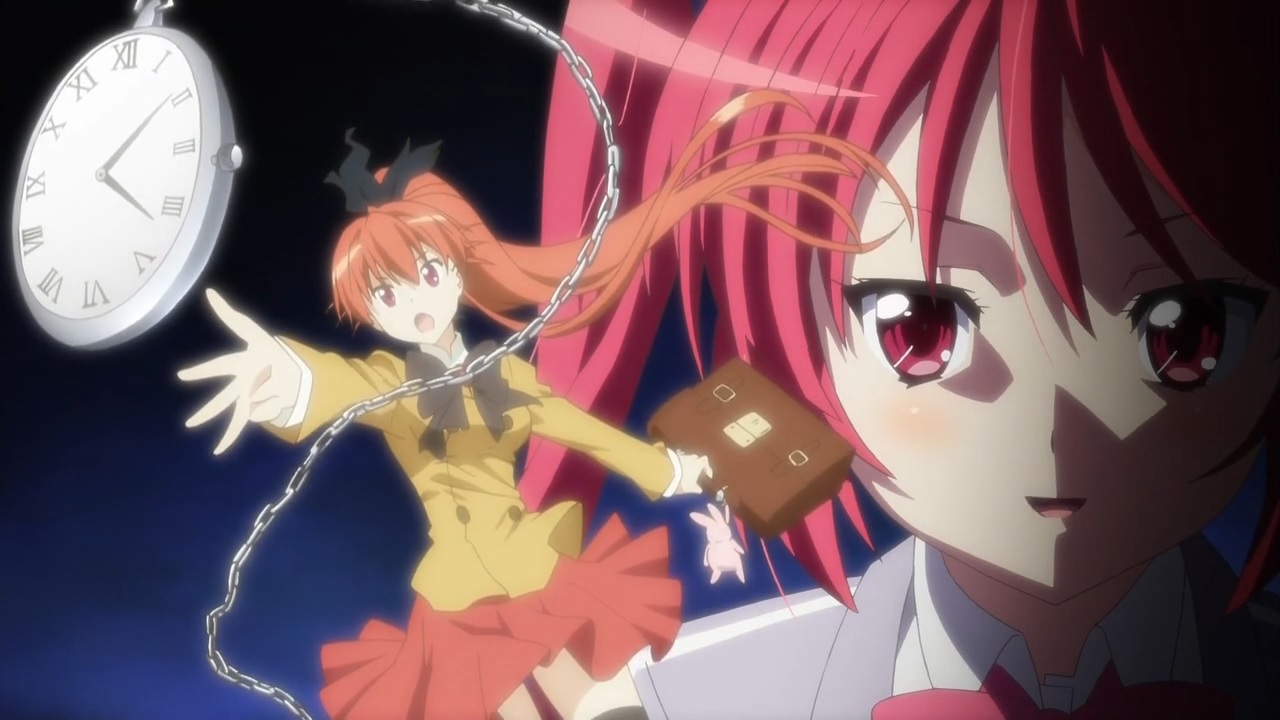
"She won't be able to return, even if she smells the scent of lavender." (1:13)
There are two references here:
* Lavender (ラベンダー) is an important item in "Toki wo Kakeru Shoujo" (時をかける少女), "The Girl Who Leapt Through Time", a novel written by Tsutsui Yasutaka (筒井康隆) and first published in 1967.S2
* This scene and Cthune's outfit are referencing the cover art of "Toki wo Kakeru Shoujo" (時をかける少女), "The Girl Who Leapt Through Time", a novel written by Tsutsui Yasutaka (筒井康隆) and published in 2009 under the Kadokawa Tsubasa Bunko (角川つばさ文庫) publishing label.S2 This novel is a re-writing of a novel by the same title and author that was originally published in 1967. Cover art for reference:
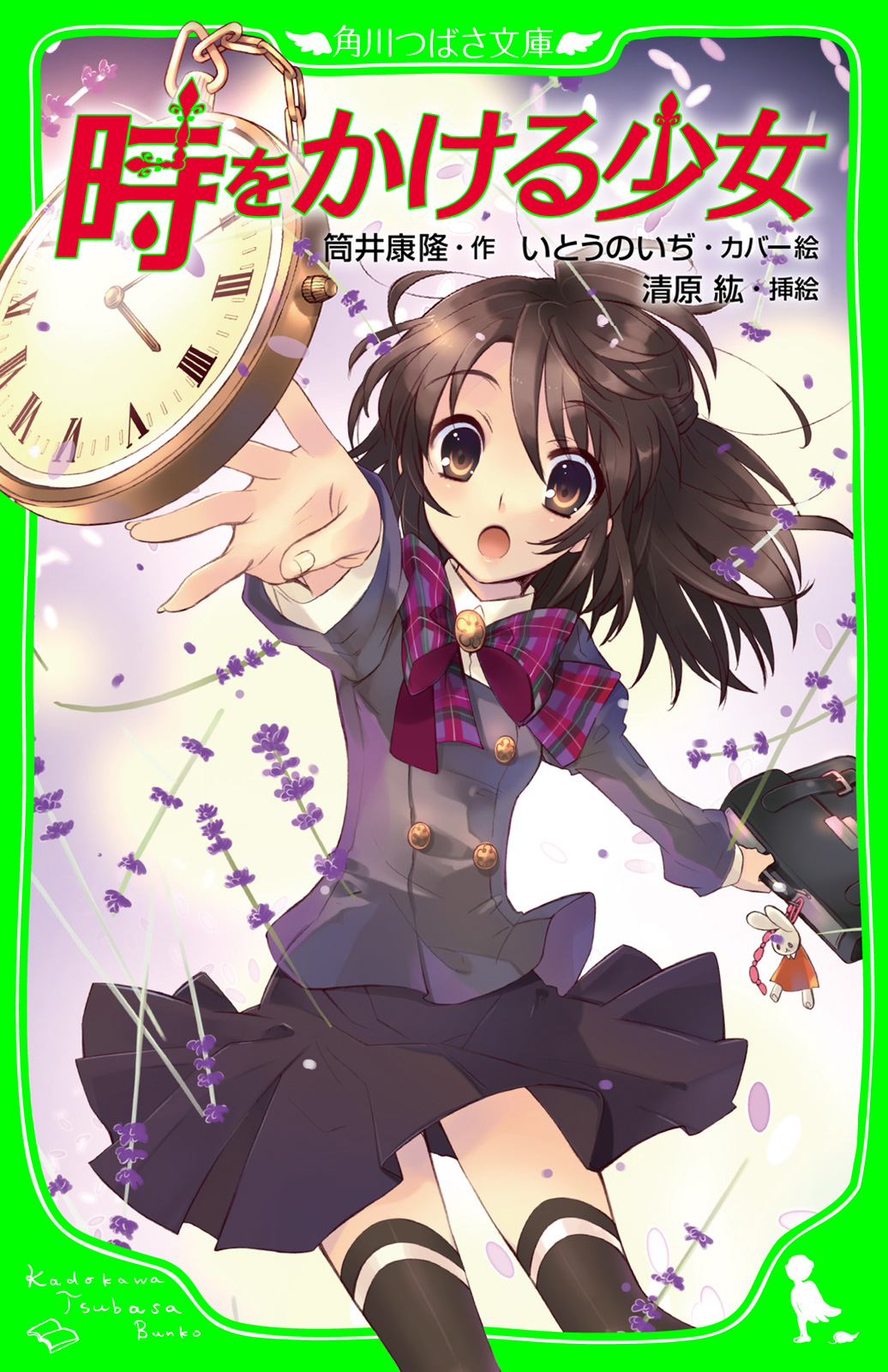
Source of image: https://bookwalker.jp/de6292f341-cdb7-426e-b683-9ade176eef39/
"I have friend ticke... I mean pool tickets." (2:32)
Yoriko was about to say "Otomo Chiketto" (オトモチケット), "Friend Ticket". This is a repeat of a reference in episode 6 of season 1 at 18:00. This is referencing an item by the same name that appears in "Monster Hunter" (モンスターハンター), a series of video games released by CAPCOM (カプコン) starting from 2004.S2
"I bought a lot of stuff like bait and ice picks from the peddler" (4:16)
"Tsurie"(釣り餌), "bait", and "pikkeru" (ピッケル), "ice pick", are consumable items that appear in "Monster Hunter" (モンスターハンター).S2
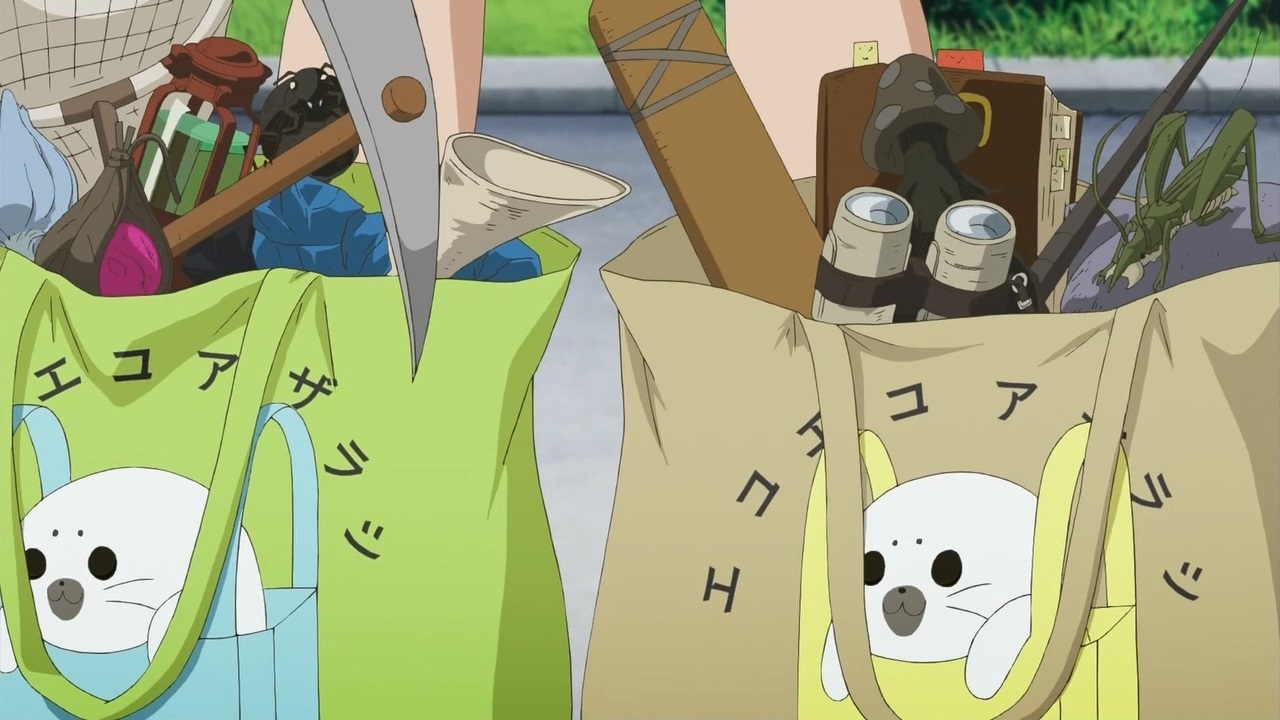
(4:19)
"Eko Eko Azarashi" (エコエコアザラシ) is written on Yoriko's eco friendly bags. This is another reference that is also a pun on the word "eco", similar to the one in episode 5 of season 1 at 4:50. There are two references here:
* This is referencing "Eko Eko Azarak" (エコエコアザラク), a manga series written by Koga Shinichi (古賀新一) and published from 1975 to 1979.S2
* "Azarashi" (アザラシ) means "earless seal". This text and the image of a white earless seal on the bags appears to be referencing "Shounen Ashibe" (少年アシベ), "Young Boy Ashibe", a manga series written by Morishita Hiromi (森下裕美) and published from 1988 to 1994.S2 In the series, the main character, Ashiya Ashibe (芦屋アシベ), has a pet white earless seal named Goma-chan (ゴマちゃん). Image for reference:
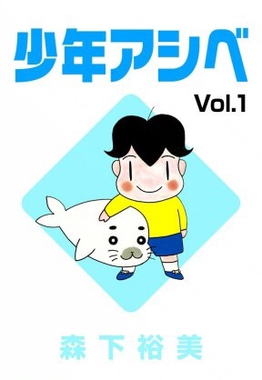
Source of image: https://en.wikipedia.org/wiki/File:Sh%C5%8Dnen_Ashibe_Volume_1.jpg
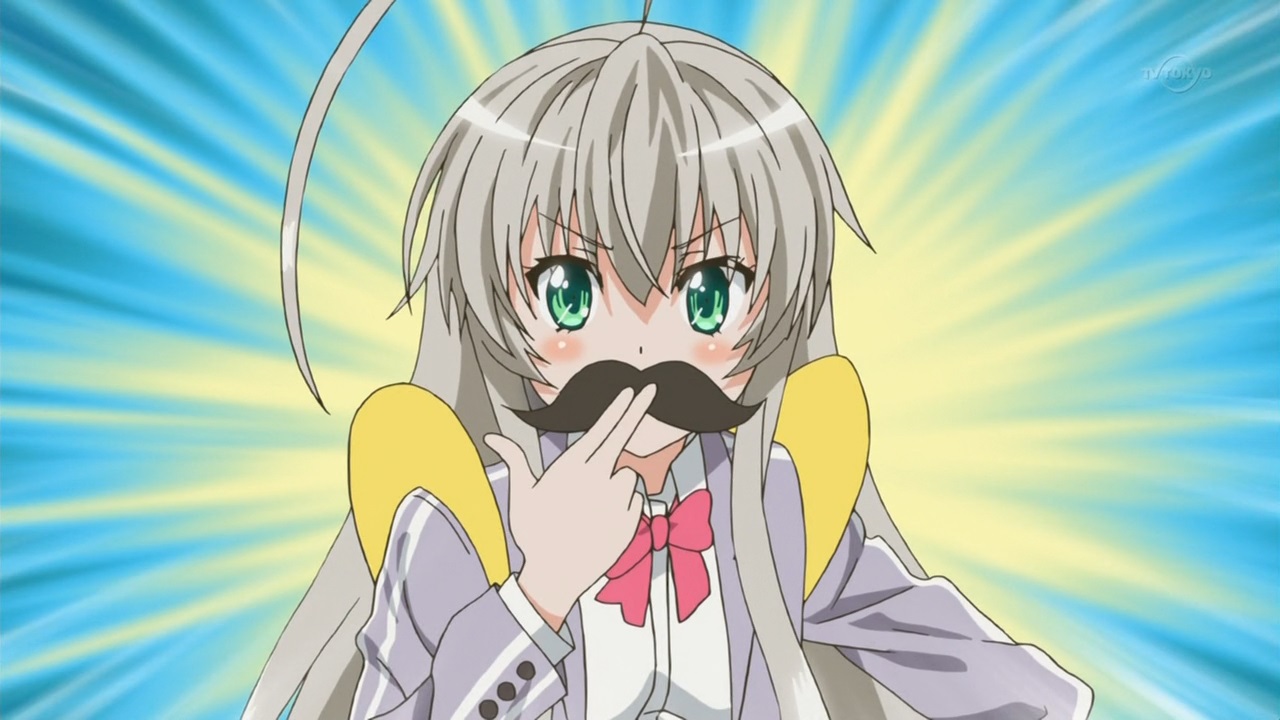
"I will charm Mahiro with my amazing sexy and commando swimsuit." (4:30)
The phrase "sekushii de komandoo na" (セクシーでコマンドーな), "sexy and commando", is referencing "Sekushii Komandoo Gaiden Sugoi yo!! Masaru-san" (セクシーコマンドー外伝 すごいよ!!マサルさん), "Sexy Commando Side Story: Masaru, that's Amazing!!", a manga series written by Usuta Kyousuke (うすた京介) and published from 1995 to 1997. In addition, the yellow rings around Nyaruko's shoulders and the fake mustache are referencing the main character of this series, Hananakajima Masaru (花中島マサル), who wears yellow rings around his shoulders and likes mustaches.S2
"A man's job is 80% determination! Anything beyond that is extra!" (5:08)
The Japanese line is "Otoko no shigoto no hachiwari ha ketsudan! Soko kara saki ha omake mitai na mono desu yo!" (男の仕事の八割は決断!そこから先はおまけみたいなものですよ!). This is referencing a line said by Narumi Soukichi (鳴海荘吉) in "Kamen Rider W" (仮面ライダーW), a Japanese TV show about a masked super hero that aired from 2009 to 2010.S2 In episode 4 of the show, Hidari Shoutarou (左翔太郎) quotes this line. The line goes, "Otoko no shigoto no hachiwari ha ketsudan da. Soko kara saki ha omake mitai na mon da" (男の仕事の八割は決断だ。そこから先はおまけみたいなもんだ), which translates to "A man's job is 80% determination. Anything beyond that is extra".
"People are 90% appearances!" (5:37)
The Japanese line is "Hito ha mitame ga kyuuwari nan da yo!" (人は見た目が九割なんだよ!). This appears to be referencing "Hito ha Mitame ga Kyuuwari" (人は見た目が9割), "People are 90% Appearances", a book written by Takeuchi Ichirou (竹内 一郎) and published in 2005.S2
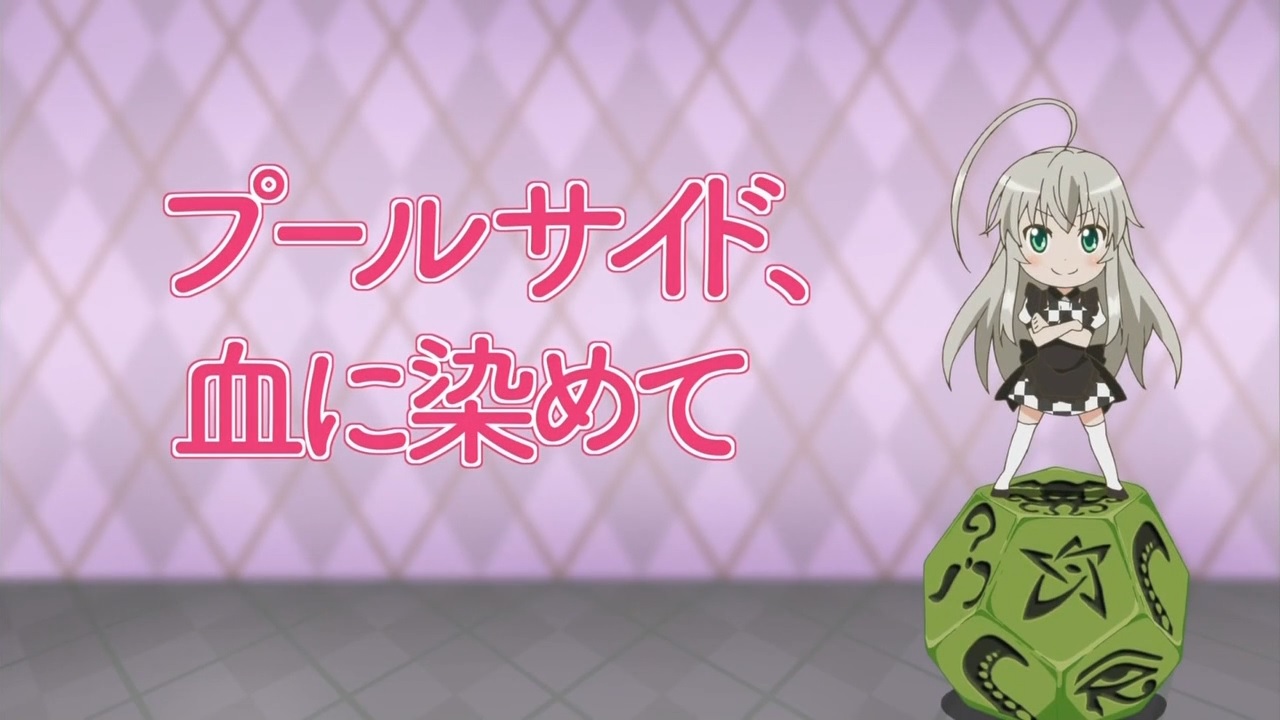
(5:43)
The title of this episode is "Puurusaido, Chi ni Somete" (プールサイド、血に染めて), which translates to "Poolside, Dyed with Blood". This is referencing "Mobile Suit Gundam" (機動戦士ガンダム), an anime series that aired from 1979 to 1980. The title of episode 28 of the series is "Taiseiyou, Chi ni Somete" (大西洋、血に染めて), which translates to "The Atlantic Ocean, Dyed with Blood".S1
(6:25)
Nyaruko's lines at this time go as follows:
「どうです?私の渚のハイカラ人魚っぷりは。キュートなヒップにドキンズキン、でしょ?」This is referencing lines from the lyrics to "Nagisa no Haikara Ningyo" (渚のはいから人魚), "Stylish Beachside Mermaid", a song sung by Koizumi Kyouko (小泉今日子) and released in 1984.S2 The original lines go as follows:
「おやおや?全然本気、私に夢中なんです?」
"Dou desu? Watashi no nagisa no haikara ningyo ppuri ha. Kyuuto na hippu ni dokin zukin, desho?"
"Oya oya? Zenzen honki, watashi ni muchuu nan desu?"
"What do you think of my stylish beachside mermaid look? Have you fallen for my cute hips?"
"Oh? Are you totally seriously crazy about me?"
「渚のはいから人魚 キュートなヒップにドキンズキン」
「全然ホンキ 君に夢中さ」
"Nagisa no haikara ningyo kyuuto na hippu ni dokin zukin"
"zenzen honki kimi ni muchuu sa"
"I'm a stylish beachside mermaid, you've fallen for my cute hips"
"I'm totally seriously crazy about you"
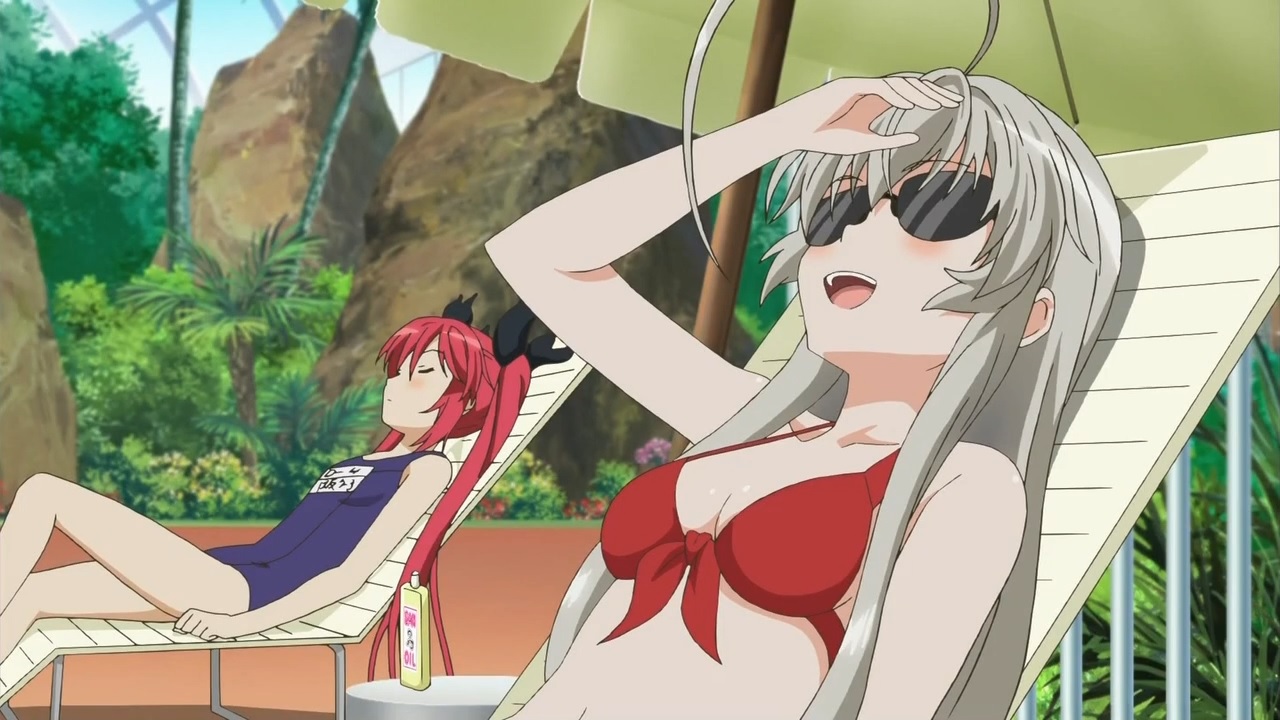
"It seems unnatural for the light of the sun to be coming from one point." (6:55)
The Japanese line is "Taiyou no hikari ga ikkasho kara kuru no tte wazatorashii desu ne" (太陽の光が一ヶ所から来るのってわざとらしいですよね). This is referencing a line said by Sayla Mass (セイラ・マス) in episode 13 of "Mobile Suit Gundam" (機動戦士ガンダム). Her line goes, "Taiyou no hikari ga ikkasho kara kuru tte wazatorashii wa ne" (太陽の光が一ヶ所から来るってわざとらしいわね), which has the same meaning as above. In addition, the above scene is referencing the scene in which Sayla says this line.S1 Image for reference:
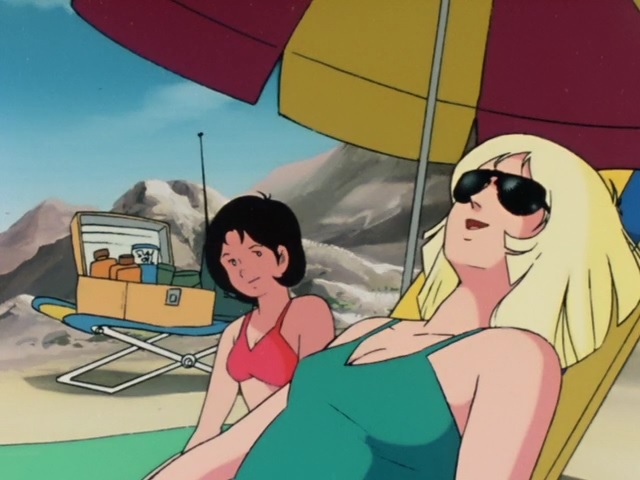
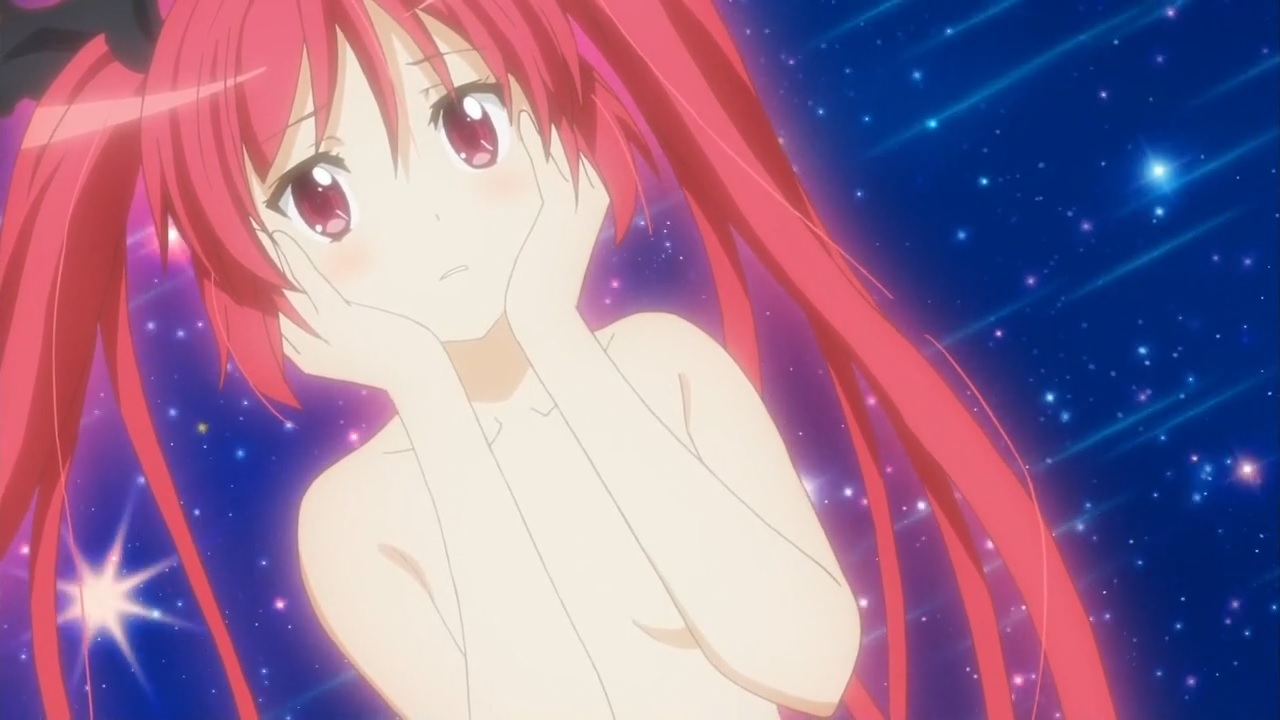
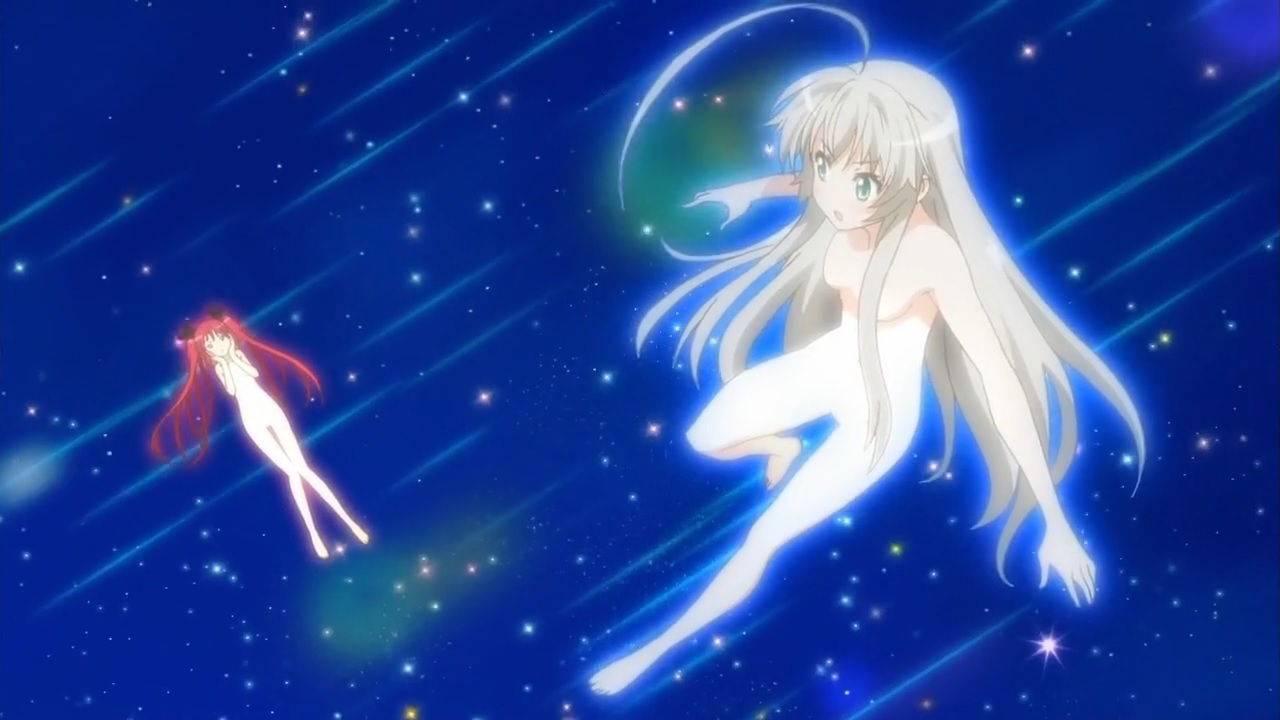
"Nyaruko... I can see time." (7:44)
The Japanese line is "Nyaruko... Toki ga mieru" (ニャル子・・・時が見える). This is referencing a line said by Lalah Sune (ララァ・スン) in episode 41 of "Mobile Suit Gundam" (機動戦士ガンダム). Her line goes, "Aa, Amuro, toki ga mieru" (ああ、アムロ、時が見える), which translates to "Ah, Amuro, I can see time". The above scene is also referencing a scene in episode 41 of "Mobile Suit Gundam".S1 Images for reference:
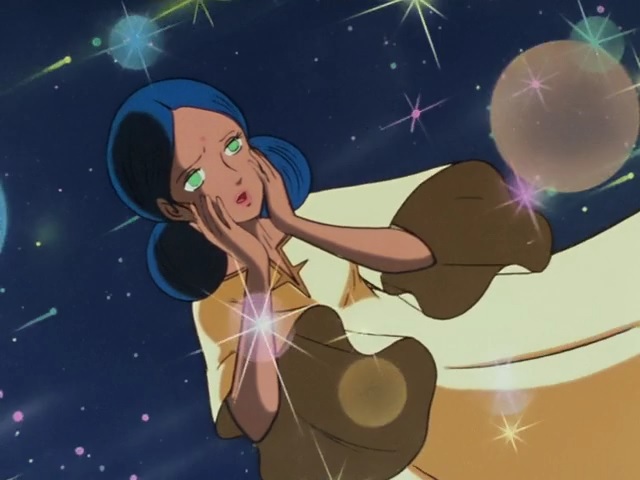
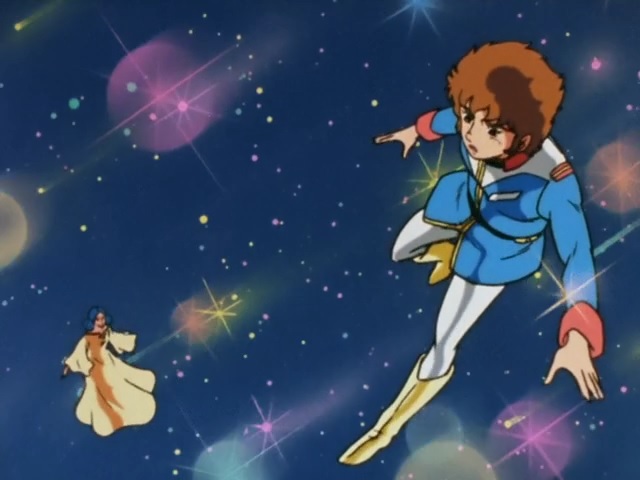
"Stop with the jokes!" (7:48)
The Japanese line is "Zaregoto ha yamenasai!" (戯れ言はやめなさい!). This is referencing a line said by Char Aznable (シャア・アズナブル) in episode 41 of "Mobile Suit Gundam" (機動戦士ガンダム).S2 His original line goes, "Raraa, yatsu to no zaregoto ha yamero!" (ララァ、ヤツとの戯言はやめろ!), which translates to "Lalah, stop joking around with him!".
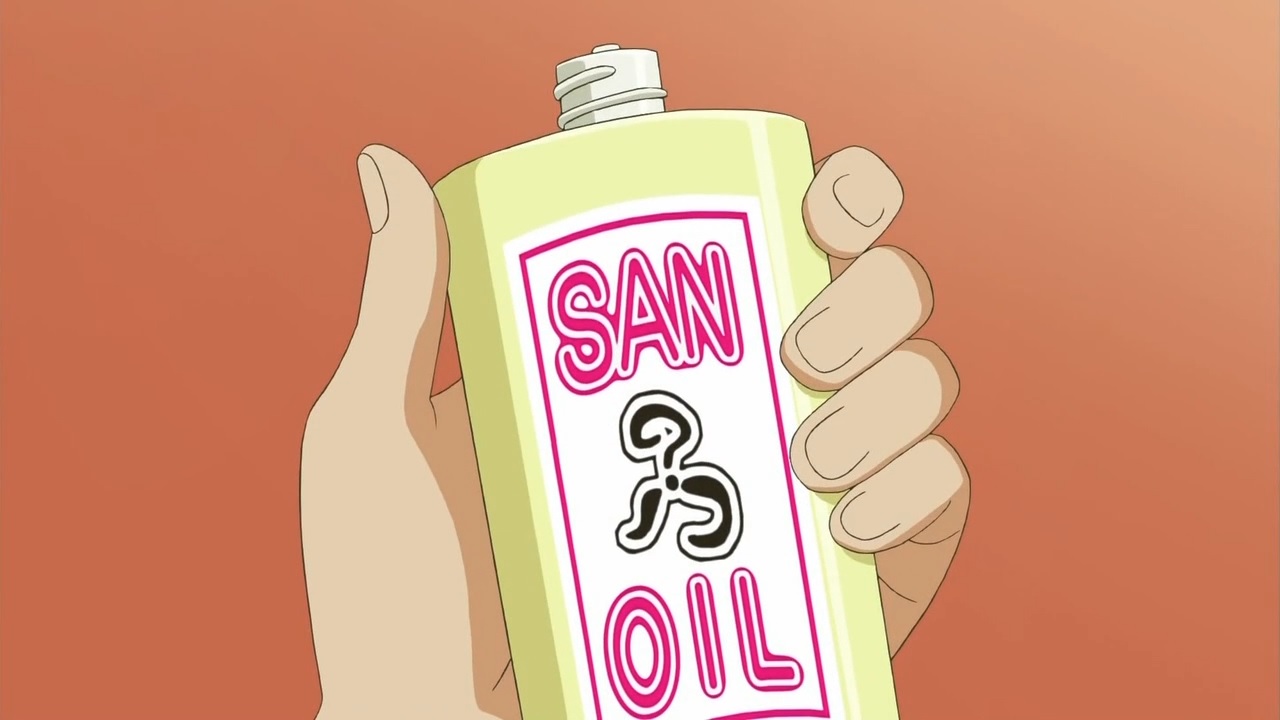
(8:20)
There are three references here:
* The text on the container says "SAN OIL". "SAN" is referencing "Call of Cthulhu", a tabletop role playing game first published in 1981 by Chaosium. According to the "Call of Cthulhu" 6th Edition Rulebook, each player's character has a numerical parameter called "Sanity", abbreviated as "SAN", that represents the character's "flexibility and resilience to emotional trauma". This number is the upper limit for a character's Sanity Points, which represent the character's current level of sanity. While playing the game, characters can encounter sanity threatening situations that can reduce their current Sanity Points. "If an investigator's current Sanity Points drop to zero, he or she is permanently insane, and normally can no longer be played."
* "SAN OIL" is a pun on "sun oil" (サンオイル), sunscreen lotion, since the Japanese pronciation of "sun" and "san" are both "san" (さん).
* The symbol on the container is referencing the Yellow Sign, which is used as the sign of Hastur in the Cthulhu Mythos. Image from the 5th edition rule book for the "Call of Cthulhu" RPG for reference:

(8:36)
The line at this time goes as follows:
「青春時代が夢なんて以下略ってことで、思いっきり楽しみましょう!道に迷っている暇はありませんよ!」Like earlier in this episode at 0:09, this is referencing lines from the lyrics to "Seishun Jidai" (青春時代), "Youthful Days", a song performed by Morita Kouichi with Topgallant (森田公一とトップギャラン) and released in 1976.S2 The original lines go as follows:
"Seishun jidai ga yume nante ika ryaku tte koto de, omoikkiri tanoshimimashou! Michi ni mayotteiru hima ha arimasen yo!"
"Youthful days are just a dream and such, so let's have as much fun as we can! We don't have time to waste losing our way!"
「青春時代が夢なんて あとからほのぼの思うもの」
「青春時代のまん中は 道に迷っているばかり」
"Seishun jidai ga yume nante ato kara honobono omou mono"
"Seishun jidai no mannaka ha michi ni mayotteiru bakari"
"Youthful days are just a dream, things to faintly recall afterwards"
"Youthful days are full of losing your way"
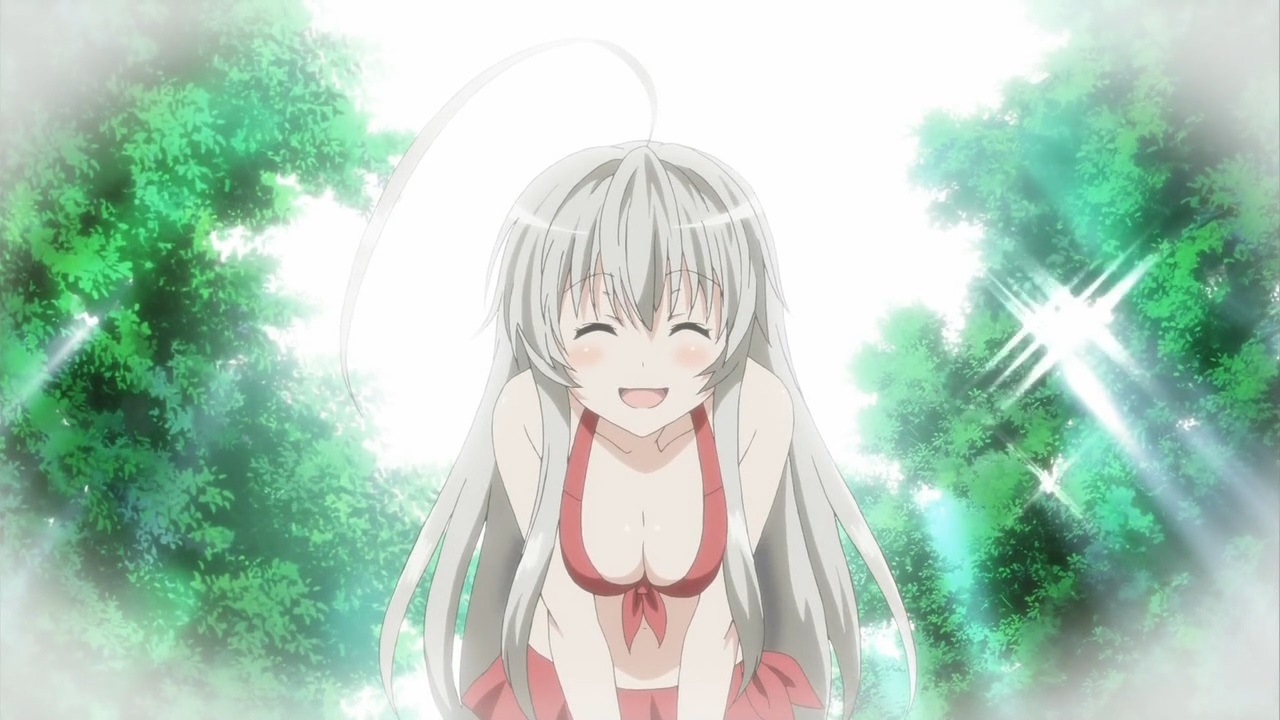
"I love you!" (9:14)
The Japanese line is "Daisuki!" (ダイスキ!). Like earlier in this episode at 0:27, this is referencing "DAISUKI!" (ダイスキ!), a Japanese variety show that aired from 1991 to 2000.S2 During the show, before each commercial break a brief eyecatch video is played in which someone will face the camera and say "Daisuki!".
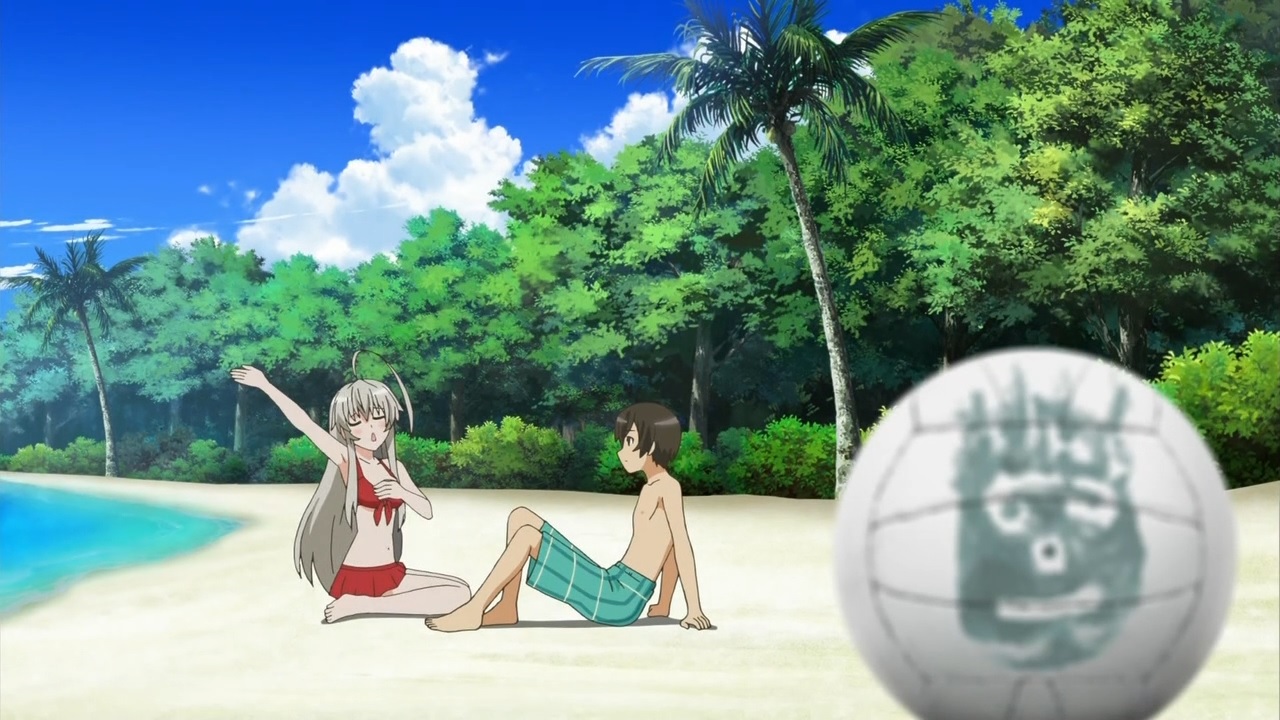
"It seems like we drifted onto an uninhabited island. In English, 'Nagasarete Airando.'" (9:51)
There are two references here:
* "Nagasarete Airando" (流されてアイランド), "Drifted Away Island", is referencing "Nagasarete Airantou" (ながされて藍蘭島), "Drifted Away Airan Island", a manga series written by Fujishiro Takeshi (藤代健) and published from 2002 and is currently ongoing.S1
* This is the volley ball that appears in this scene.
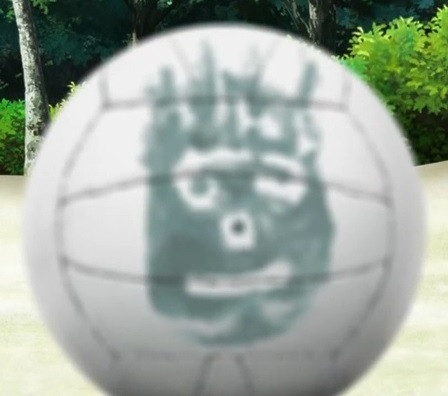
This volley ball is referencing Wilson from "Cast Away", an American movie that was released in 2000.S1 Wilson is a volley ball with a face drawn on it in blood, and it serves as the only companion of Chuck Noland, the main character of the movie who is stranded on an uninhabited island. Image of Wilson for reference:
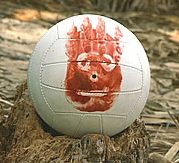
Source of image: https://en.wikipedia.org/wiki/File:Wilson_The_Volleyball.jpg
(10:14)
The line at this time goes as follows:
「真尋さんさえいてくれたら天国です。天国に一番近い無人島です。」Keeping with the musical theme in this episode, this appears to be referencing "Tengoku ni Ichiban Chikai Shima" (天国にいちばん近い島), "The Island Closest to Heaven", a song sung by Harada Tomoyo (原田知世) and released in 1984.S2 This song was used as the theme song for a movie by the same title that was released in 1984.
"Mahiro-san sae ite kuretara tengoku desu. Tengoku ni ichiban chikai mujintou desu."
"As long as you're here, I'm in heaven. The deserted island closest to heaven."
"Let's tell an uninhabited island story!" (10:25)
"Mujintou Monogatari" (無人島物語), "Uninhabited Island Story", is the name of a game released in 1994.S2
(11:08)
The lines at this time go as follows:
「人を殴るのは簡単なんですよ!」This is referencing lines in the lyrics to "FNS Chikyuu Tokusoutai Daibasutaa" (FNS地球特捜隊ダイバスター), "FNS Earth Special Investigation Force Dybastar", a song sung by TOMMY and released in 2005. This song is the opening theme song to "FNS Chikyuu Tokusoutai Daibasutaa" (FNS地球特捜隊ダイバスター), "FNS Earth Special Investigation Force Dybastar", an anime series that aired from 2005 to 2009. The original lines go as follows:
「ニャル子、痛くなるより仲良くなって、素敵なことしよう!」
「殴られなくても殴り返しますよ!」
"Hito wo naguru no ha kantan nan desu yo!"
"Nyaruko, itaku naru yori naka yoku natte, suteki na koto shiyou!"
"Nagurarenakutemo naguri kaeshimasu yo!"
"It's easy to hit someone!"
"Nyaruko, instead of causing pain let's get along, and do wonderful things!"
"Even if you didn't hit me I'll hit you back!"
「ひとをなぐるのは かんたんだけど」
「いたくなるより なかよくすれば ステキなことさ」
「みつめられたら みつめかえすぜ マジで」
"Hito wo naguru no ha kantan da kedo"
"itaku naru yori naka yoku sureba suteki na koto sa"
"mitsumeraretara mitsume kaesu ze maji de"
"While it's easy to hit someone"
"Instead of causing pain, if you can get along it's a wonderful thing"
"If you gaze at me, I'll gaze back at you, seriously"
"I know someone who's a super laywer." (11:47)
The phrase "suupaa bengoshi" (スーパー弁護士), "super lawyer", is referencing Kitaoka Shuuichi (北岡秀一) from "Kamen Rider Ryuki" (仮面ライダー龍騎), a Japanese TV show about a masked super hero that aired from 2002 to 2003.S2 Kitaoka is a talented lawyer who thinks highly of himself, and in episode 50 he says, "Suupaa bengoshi desu kara" (スーパー弁護士ですから), which translates to "I'm a super lawyer after all".
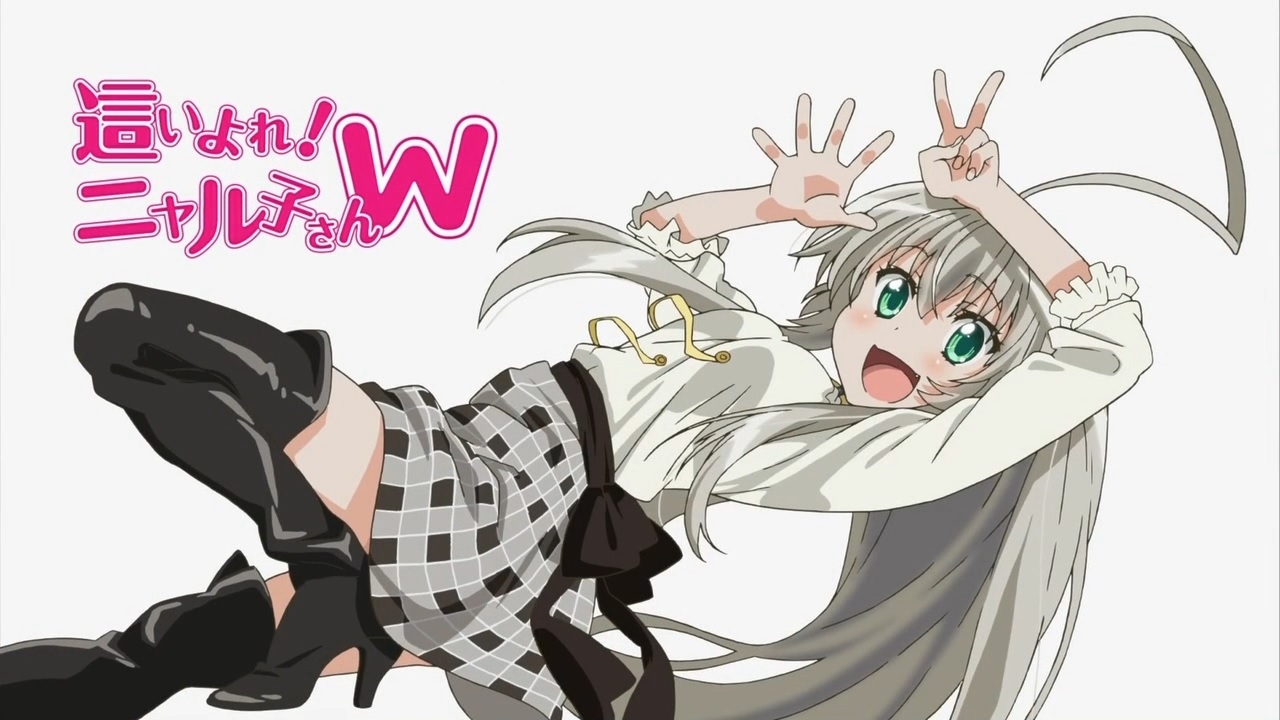
"I am the 7% woman!" (13:02)
The Japanese line is "Watashi ga, nana paasento no onna desu!" (私が7%の女です!). This is quoting a sentence said by Asumi Kana (阿澄佳奈), Nyaruko's voice actor, at DIVEⅡ SUMMIT 2012 in Yokohama BLITZ, a live event held on April 7, 2012 to promote "Haiyore! Nyaruko-san".S1 In attendance were Asumi Kana (阿澄佳奈), Kitamura Eri (喜多村英梨), Matsuki Miyu (松来未祐), and Ootsubo Yuka (大坪由佳), the voice actors of Nyaruko, Mahiro, Cthuko, and Tamao respectively. During the event there was a segment during which people watching the event on the Nicovideo live stream would be surveyed. The voice actors would attempt to guess something related to "hikkoshi" (引越し), "changing residence", that pertained to 7% of the audience. Asumi Kana guessed that 7% of the audience changed their residence during April of 2012. Upon finding out she was correct, she exclaimed, "Watashi ga nana paasento no onna desu!" (私が7%の女です!), which translates to "I am the 7% woman!". In addition, Nyaruko's outfit is based on the outfit that Asumi Kana was wearing at this live event. Image for reference:
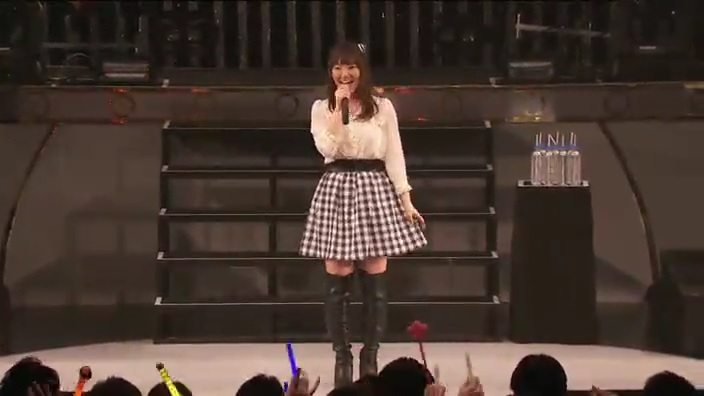
Video for reference: https://youtube.com/watch?v=k0YaWRiJB98
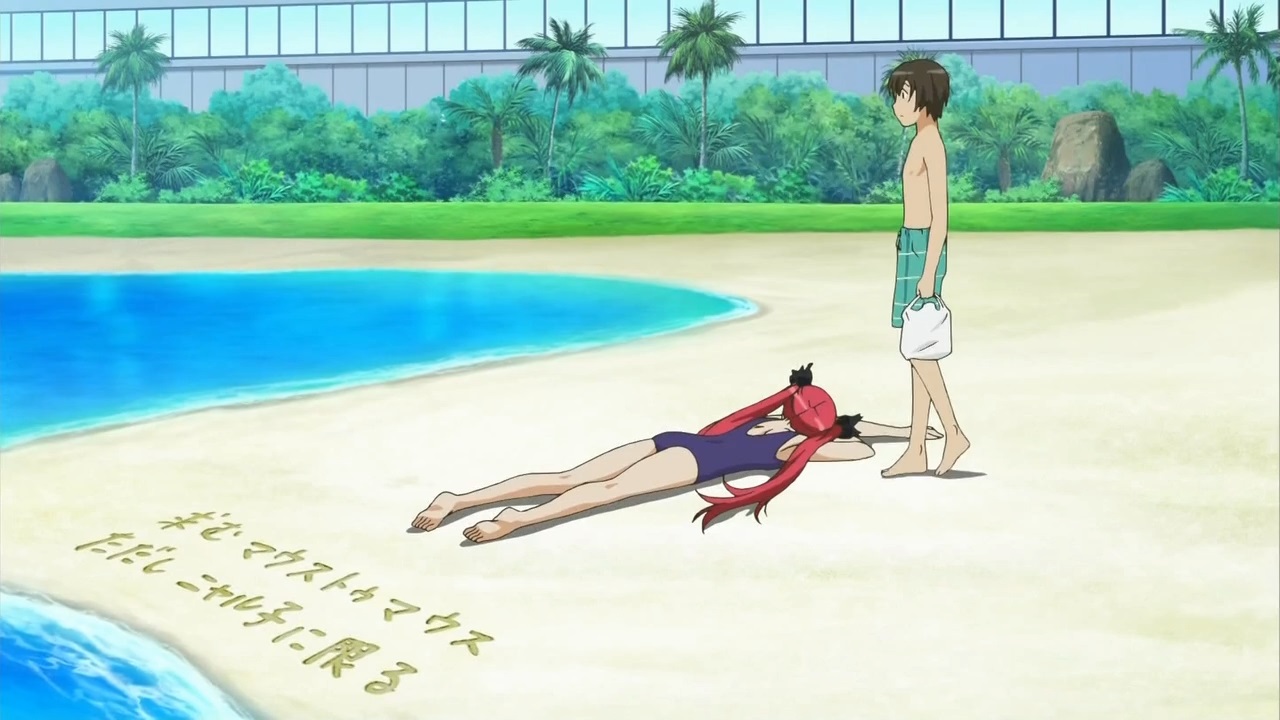
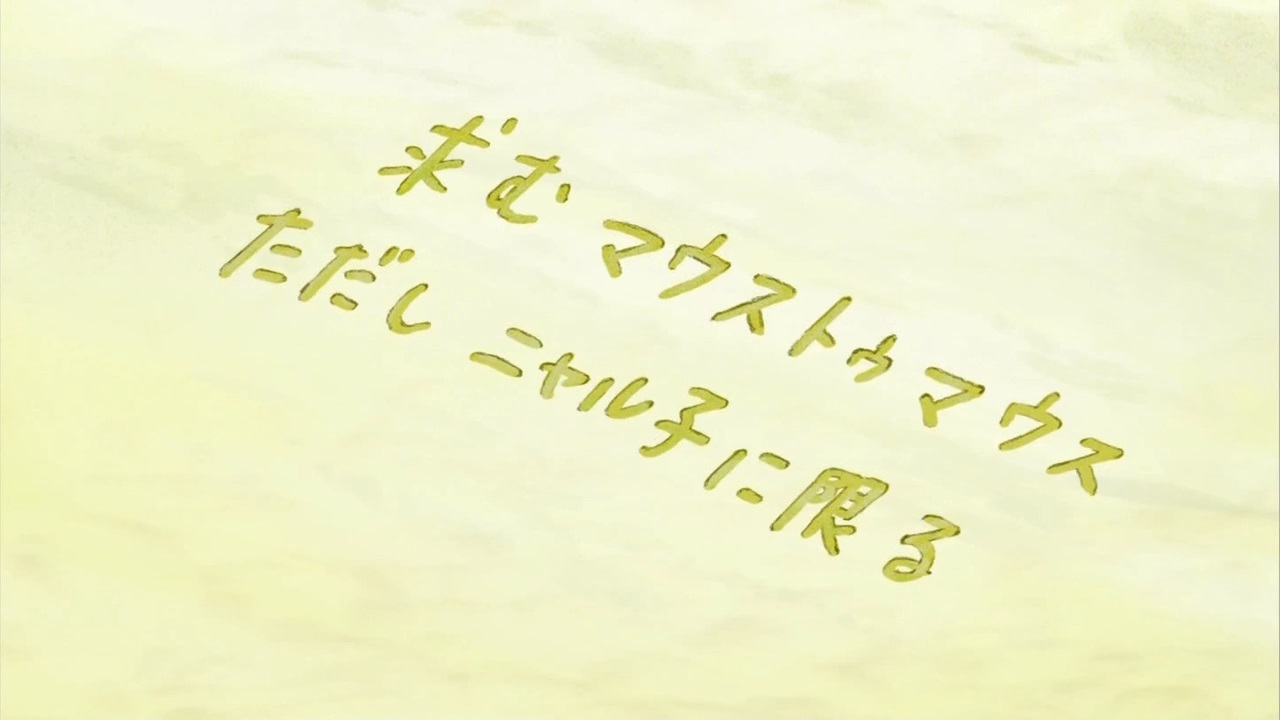
"Seeking mouth to mouth. However, Nyaruko only." (14:41)
In Cthuko's message, the phrase "Tadashi Nyaruko ni kagiru" (ただし ニャル子に限る), "However, Nyaruko only", is referencing Japanese internet slang. The original line goes, "Tadashi, ikemen ni kagiru" (ただし、イケメンに限る), which translates to "However, handsome guys only".S2
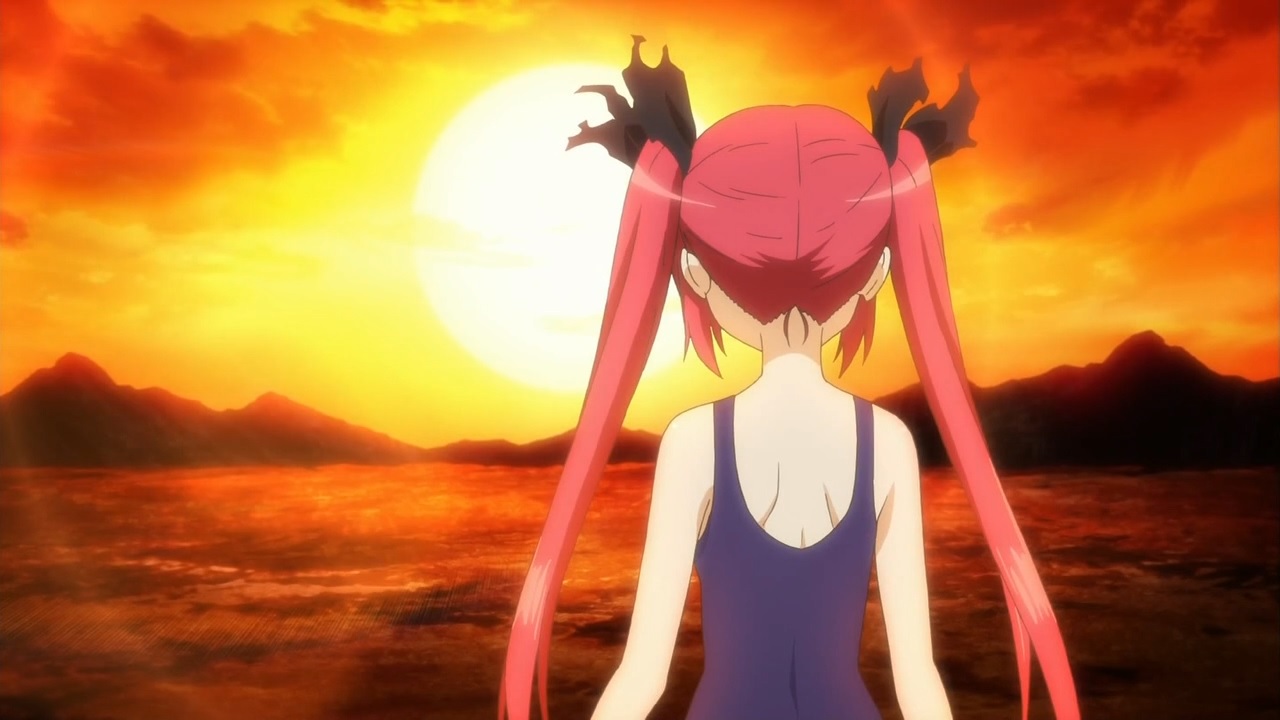
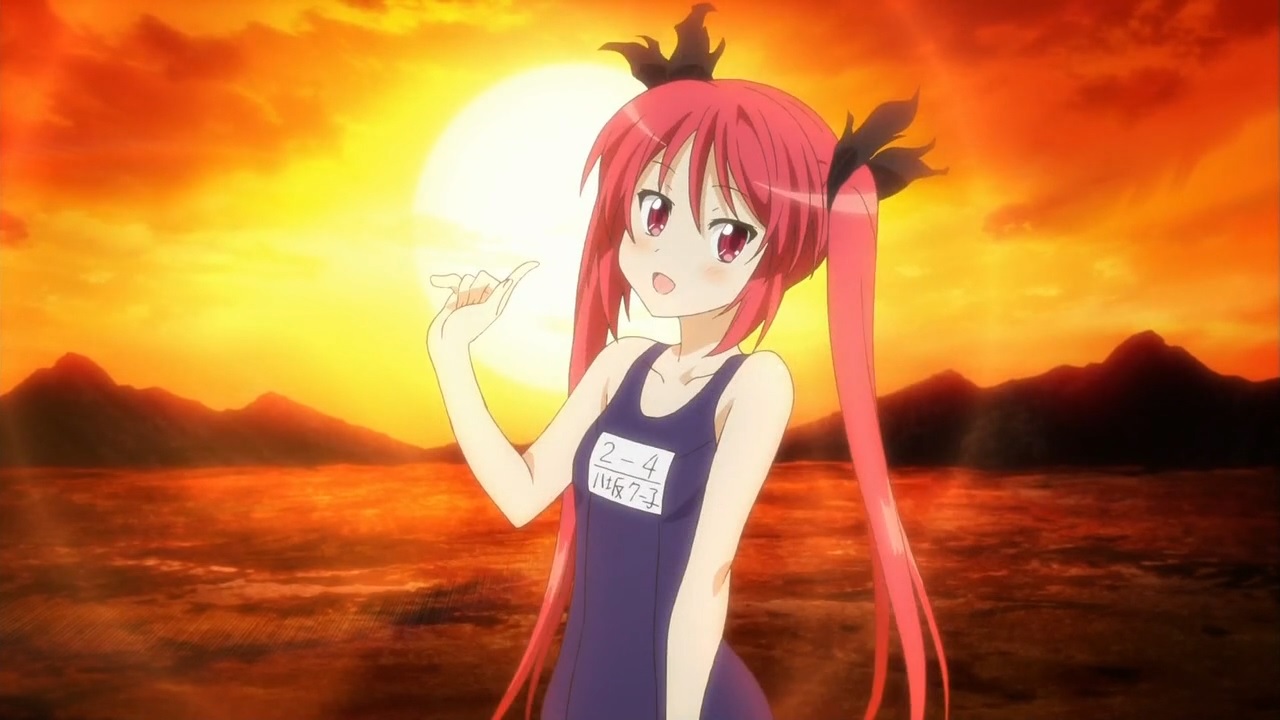
(15:57)
The lines at this time go as follows:
「そんな少年が、ダイ・・・」There are two references here:
「バスター!」
"Sonna shounen ga, dai..."
"Basutaa!"
"I lov..."
"Bastar!"
* Cthuko was about to say "Daisuki!" (ダイスキ!), which translates to "I love you!". Like earlier in this episode at 0:27, this is referencing "DAISUKI!" (ダイスキ!), a Japanese variety show that aired from 1991 to 2000.S2 During the show, before each commercial break a brief eyecatch video is played in which someone will face the camera and say "Daisuki!".
* After Cthuko says "dai" (ダイ), Nyaruko interrupts her and says "basutaa" (バスター). As a whole this produces the phrase "daibasutaa" (ダイバスター), "dybastar", which is referencing "FNS Chikyuu Tokusoutai Daibasutaa" (FNS地球特捜隊ダイバスター), "FNS Earth Special Investigation Force Dybastar", an anime series that aired from 2005 to 2009. In addition, the above scene of Cthuko facing a sunset over the mountains is referencing the ending animation sequnce of "FNS Chikyuu Tokusoutai Daibasutaa".S2 Image for reference:
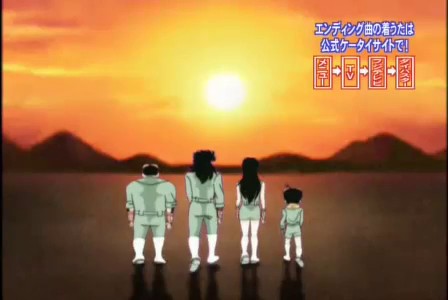
(16:04)
The line at this time goes as follows:
「私のいないところで!たまにはハメを外してはしゃいでみたってわけですか?!」This is referencing a line in the lyrics to "Yuke! Daibasutaa" (ゆけ! ダイバスター), "Go Forth! Dybastar", a song sung by TOMMY and released in 2005. This song is the ending theme song for "FNS Chikyuu Tokusoutai Daibasutaa" (FNS地球特捜隊ダイバスター), "FNS Earth Special Investigation Force Dybastar".S2 The original line goes as follows:
"Watashi no inai tokoro de! Tama ni ha hame wo hazushite hashaide mita tte wake desu ka?!"
"While I wasn't around! Occasionally you tried letting loose and being merry?!"
「でもたまには ハメをはずして はしゃいでみたい」
"Demo tama ni ha hame wo hazushite hashaide mitai"
"But occasionally I want to try letting loose and being merry"
(16:11)
The line at this time goes as follows:
「冷たく切り捨てられてしまっては、心が彷徨うばかりです!昨日はあんなに一緒だったのに、夕暮れはもう違う色ですか?」This is referencing lines from the lyrics to "Anna ni Issho Datta no ni" (あんなに一緒だったのに), "Even Though We Were Together That Much", a song sung by See-Saw and released in 2002.S2 This song is the first ending theme song for "Mobile Suit Gundam SEED" (機動戦士ガンダムSEED), an anime series that aired from 2002 to 2003. The original lines go as follows:
"Tsumetaku kirisuterarete shimatte ha, kokoro ga samayou bakari desu! Kinou ha anna ni issho datta no ni, yuugure ha mou chigau iro desu ka?"
"If I am coldly discarded, my heart will do nothing but wander! Yesterday even though we were together that much, is the twilight already a different color?"
「冷たく切り捨てた心は彷徨うばかり」
「あんなに一緒だったのに 夕暮れはもう違う色」
"Tsumetaku kirisuteta kokoro ha samayou bakari"
"Anna ni issho datta no ni yuugure ha mou chigau iro"
"The coldly discarded heart does nothing but wander"
"Even though we were together that much, the twilight is already a different color"
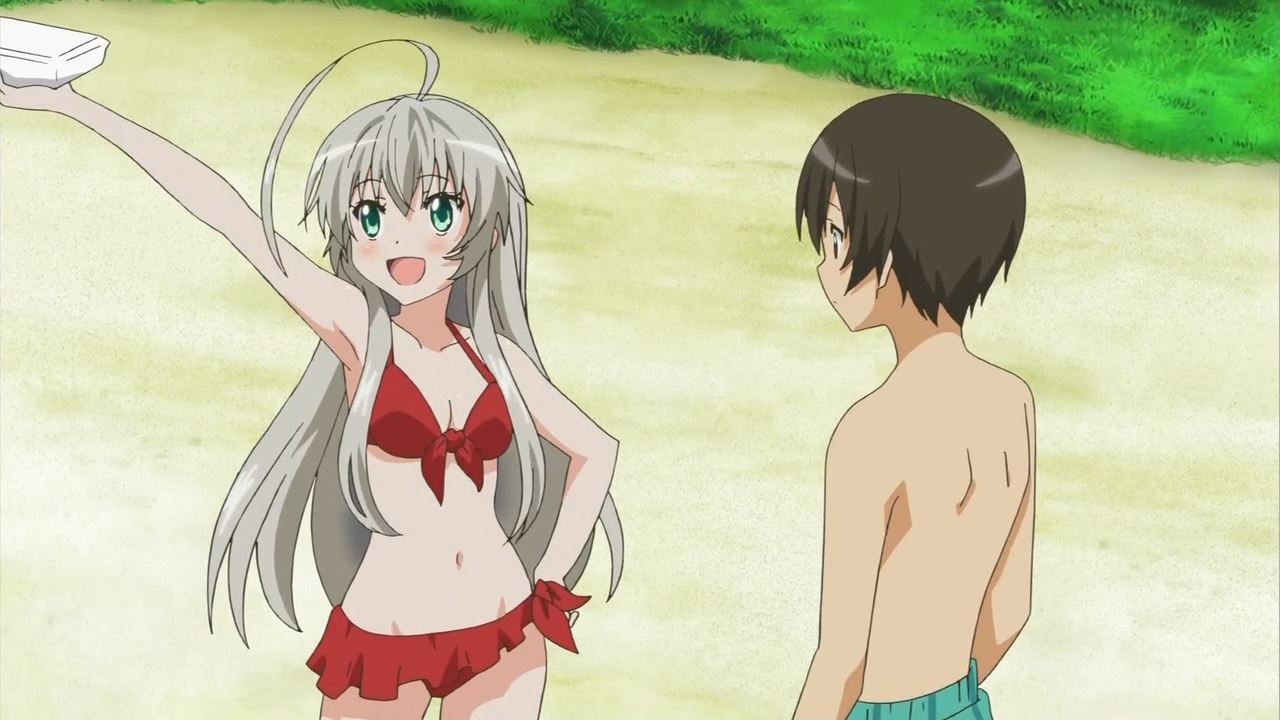
"Thank you! And again, thank you!" (16:32)
The Japanese line is "Arigatou gozaimasu! Soshite, arigatou gozaimasu!" (ありがとうございます!そしてありがとうございます!). This is referencing a catch phrase said by Sky High (スカイハイ) from "Tiger & Bunny" (タイガー・アンド・バニー), an anime series that aired in 2011. His line goes, "Arigatou! Soshite, arigatou!" (ありがとう!そして、ありがとう!), which has the same meaning as above. Nyaruko's poses also mimic those of Sky High when he says this catch phrase.S1 Images for reference:

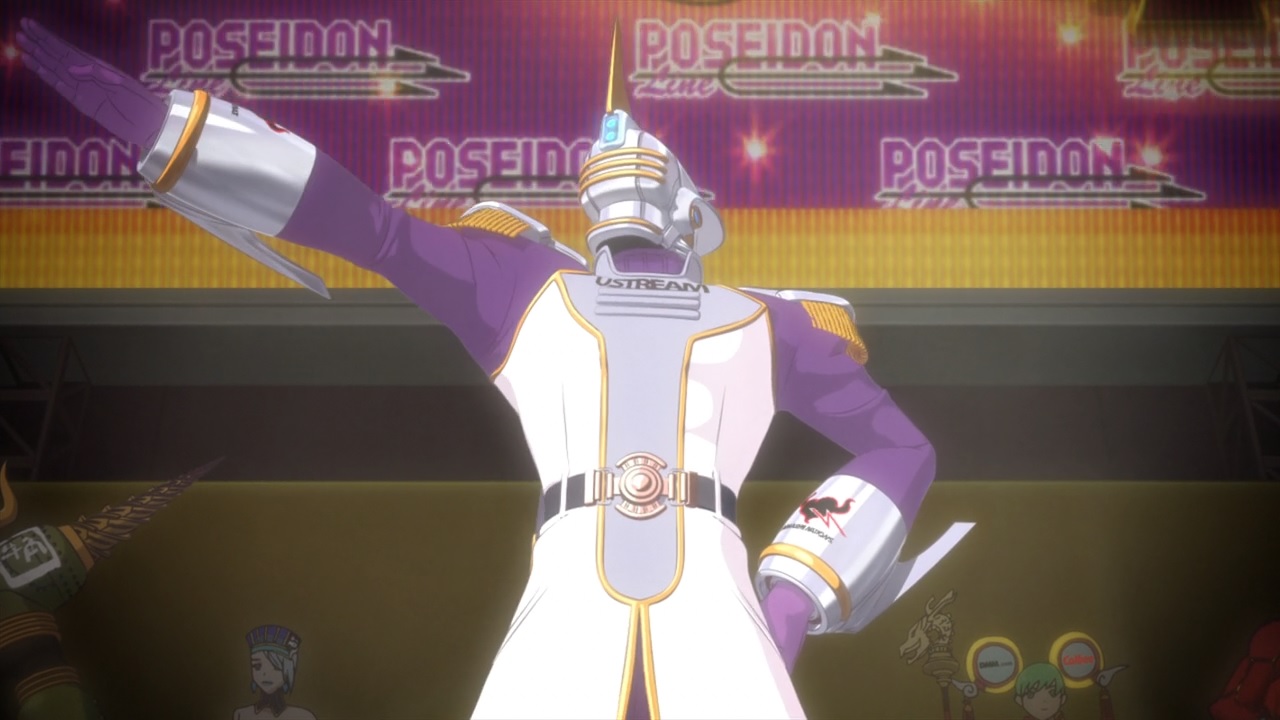
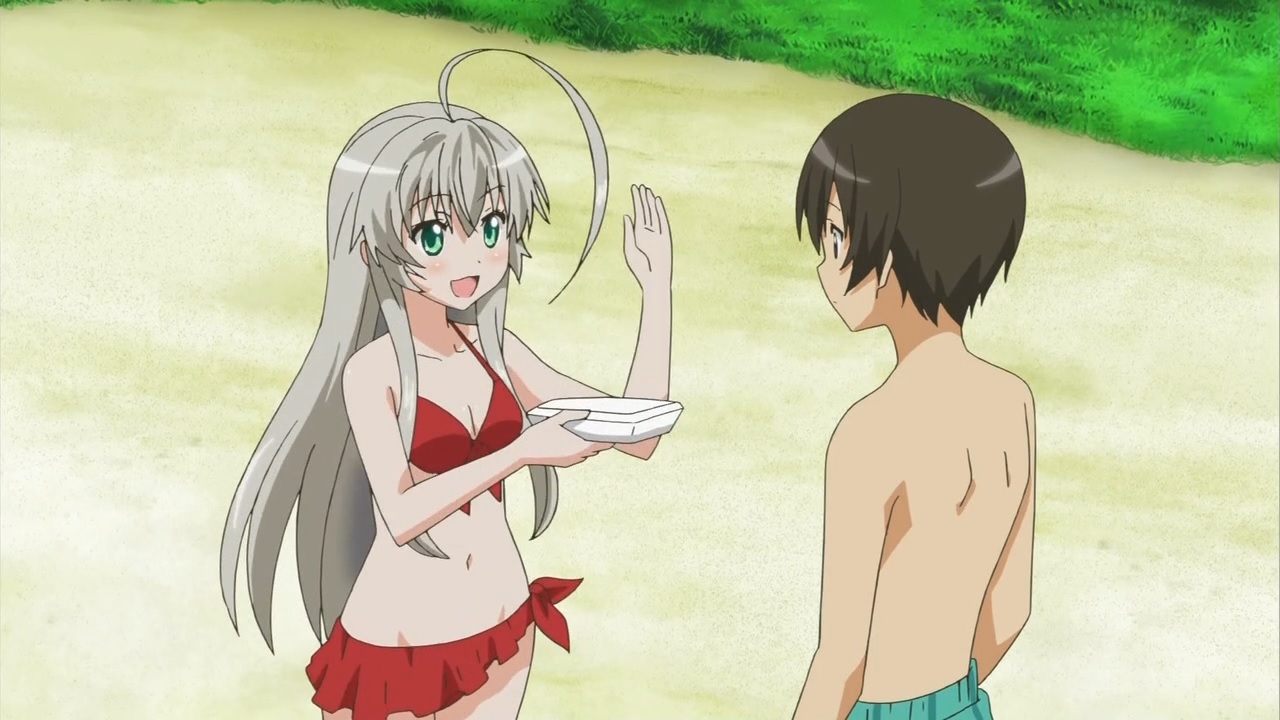
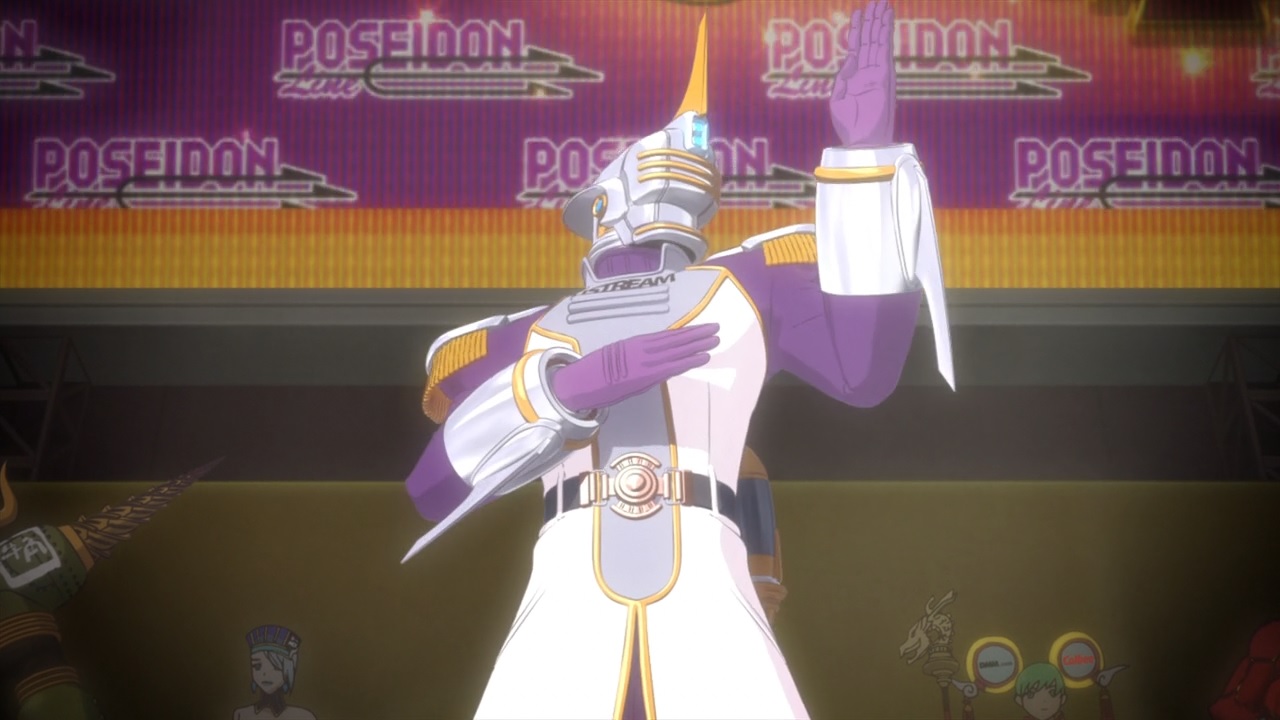
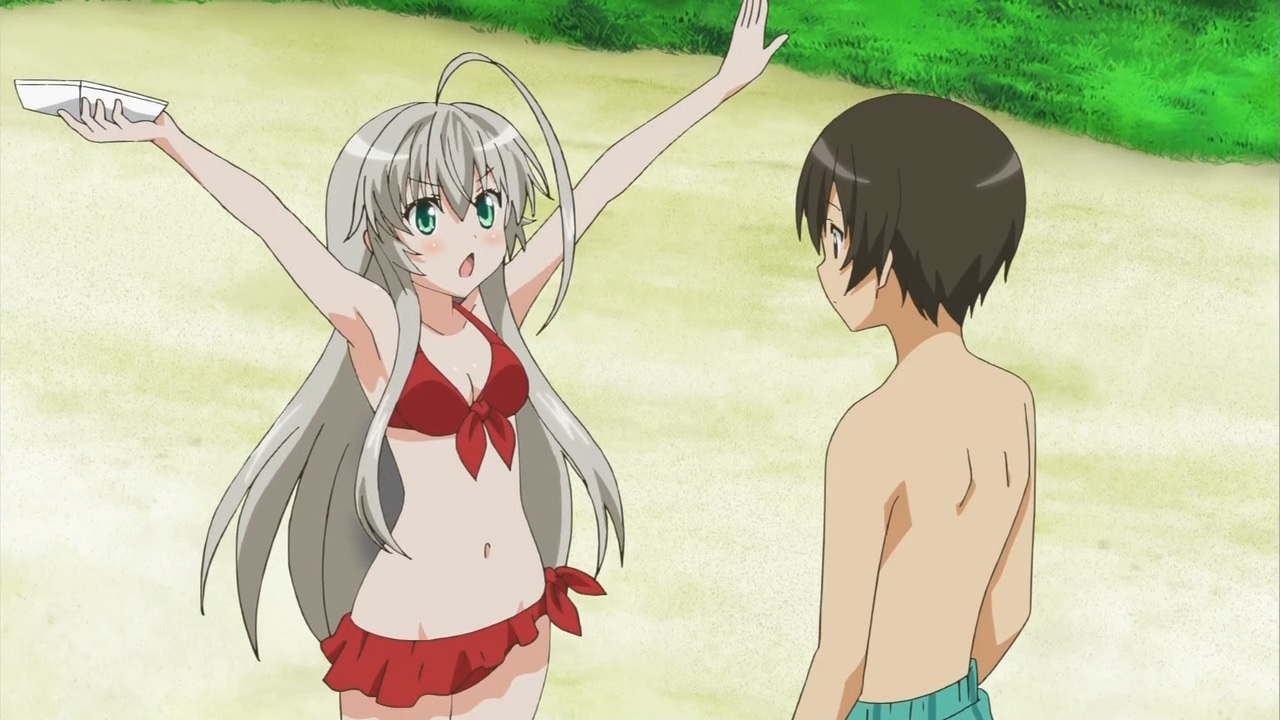
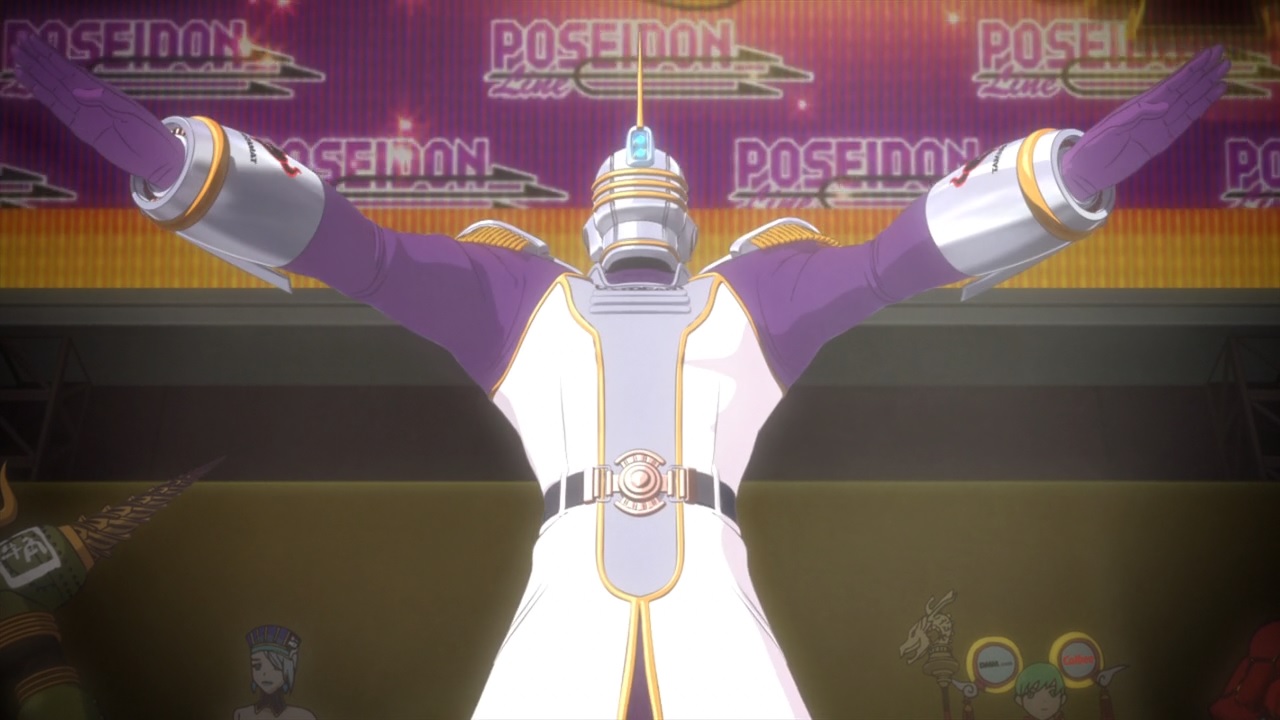
"Let's settle once and for all who's white and black necro." (17:00)
The phrase "shirokuro nekuro" (白黒ネクロ), "white and black necro", is referencing "Shirokuro Nekuro" (シロクロネクロ), "White and Black Necro", a light novel series written by Taube Sadato (多宇部貞人) and published from 2011 and is currently ongoing.S2 The alternate title for the series is "White Necromancer & Black Necromancer".
"If I don't settle this right now, my pride as the crawling chaos will be crushed!" (17:03)
The Japanese line is "Koko de kimenakereba haiyoru konton ga sutarimasu!" (ここで決めなければ這いよる混沌が廃ります!). This is referencing a catch phrase said by Houjou Hibiki (北条響) in "SUITE PRECURE♪" (スイートプリキュア♪), an anime series that aired from 2011 to 2012.S2 Her line goes, "Koko de kimenakya onna ga sutaru!" (ここで決めなきゃ女がすたる!), which translates to "If I don't settle this right now, my pride as a woman will be crushed!".
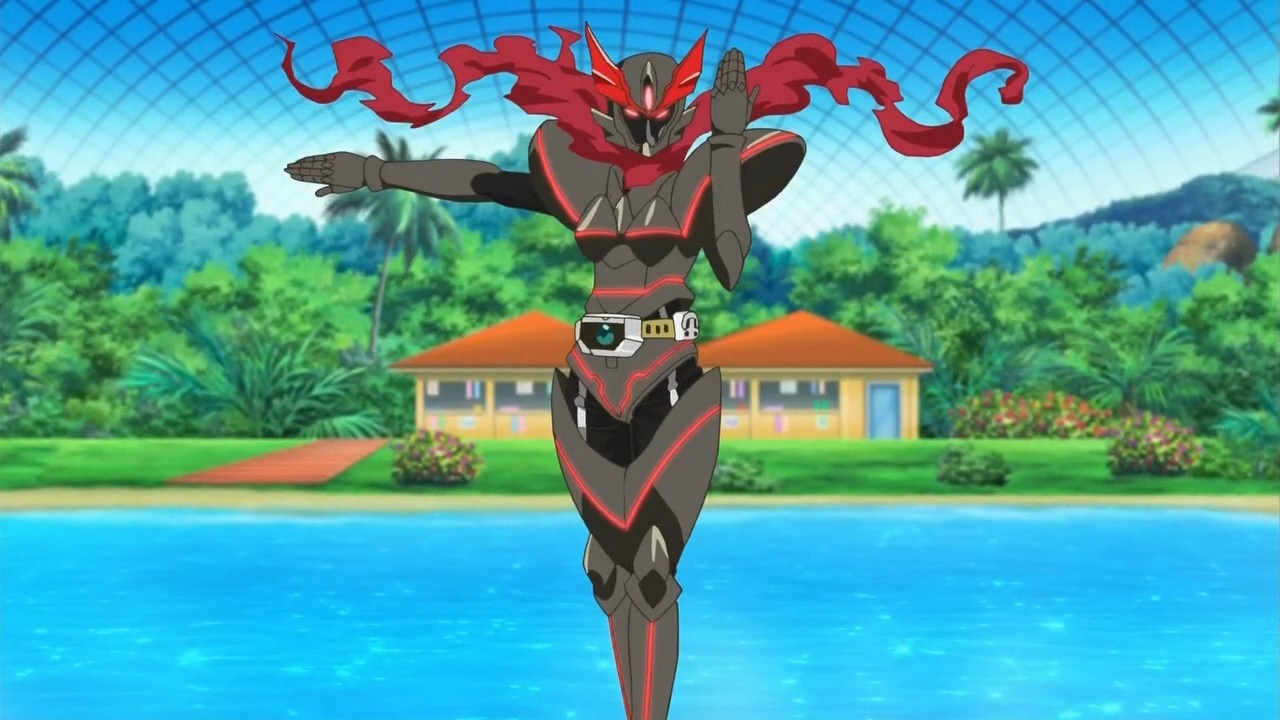
(17:12)
Nyaruko's pose is referencing a pose done by Kamen Rider Wizard in "Kamen Rider Wizard" (仮面ライダーウィザード). Images for reference:
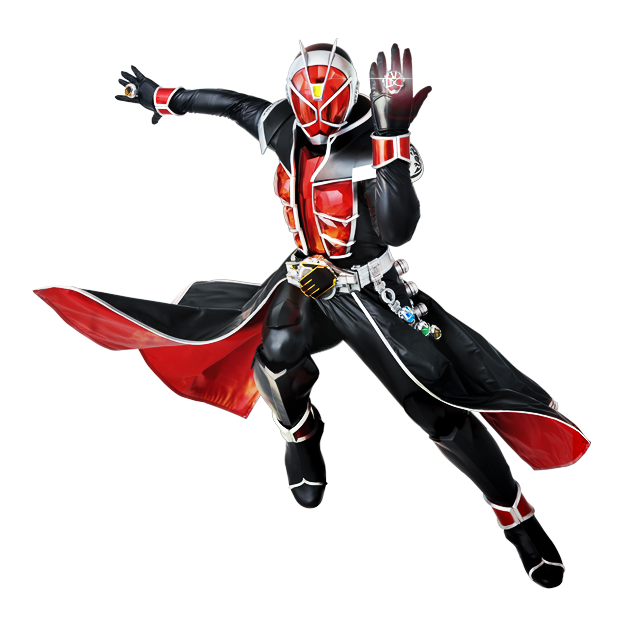
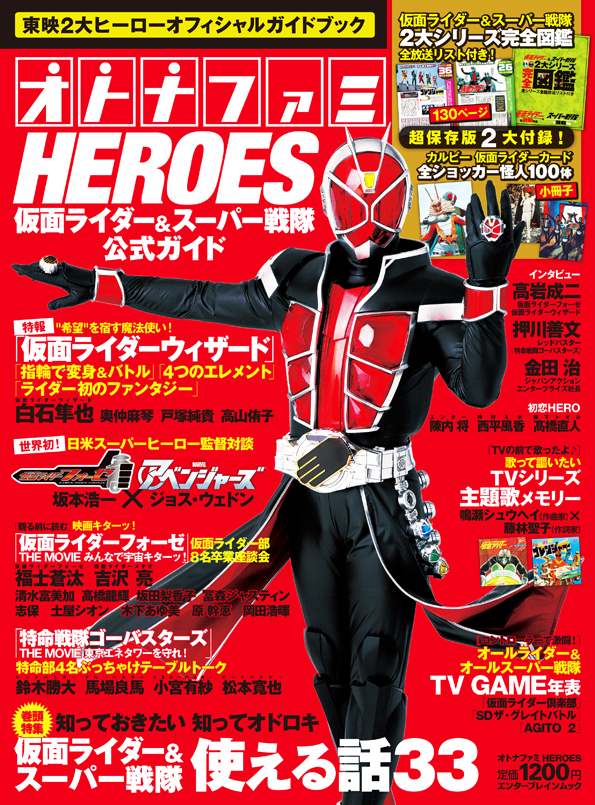
Image sources:
http://www.tv-asahi.co.jp/wizard/sphone/
http://www.news2u.net/releases/102983
"I'll show you my scorching fighting spirit combo." (17:13)
The Japanese line is "Watashi mo, shakunetsu no kiai konbo, misete ageru" (わたしも、灼熱の気合コンボ、見せてあげる). On page 166 of volume 7 of the "Haiyore! Nyaruko-san" light novel series, this line is written as follows.
「わたしも気合の灼熱コンボ、見せてあげる」There are two references here:
"Watashi mo kiai no shakunetsu konbo, misete ageru"
"I'll show you my scorching combo of fighting spirit."
* This is referencing a catch phrase said by Minamino Kanade (南野奏) in "SUITE PRECURE♪" (スイートプリキュア♪).S2 Her line goes, "Kiai no reshipi, misete ageru wa!" (気合のレシピ、見せてあげるわ!), which translates to "I'll show you my recipe of fighting spirit!".
* The phrase "shakunetsu konbo" (灼熱コンボ), "scorching combo", is referencing Kamen Rider OOO from "Kamen Rider OOO" (仮面ライダーオーズ), a Japanese TV show about a masked super hero that aired from 2010 to 2011.S2 One of Kamen Rider OOO's forms is the "Ratoraataa Konbo" (ラトラーターコンボ), which is also known as "Shakunetsu Konbo" (灼熱コンボ), "scorching combo".
(17:50)
The lines at this time go as follows:
ニャル子: 「クー子、私は後何回ボコればいいんです?私は後何回、あんたとあんたの機動砲台に腹パンすればいいんですか?」This is referencing a line said by Heero Yui (ヒイロ・ユイ) in "Gundam Wing: Endless Waltz" (新機動戦記ガンダムW Endless Waltz), an anime series that was released in 1997 and later released as a movie in 1998. Heero's line goes as follows:
クー子: 「ニャル子は私に何も言ってくれない。教えて、ニャル子!」
Nyaruko: "Kuuko, watashi ha ato nankai bokoreba ii n desu? Watashi ha ato nankai, anta to anta no kidou houdai ni harapan sureba ii n desu ka?"
Kuuko: "Nyaruko ha watashi ni nani mo itte kurenai. Oshiete, Nyaruko!"
Nyaruko: "Cthuko, how many more times do I need to beat you up? How many more times, do I need to gut punch you and your mobile turrets?"
Cthuko: "You won't tell me anything. Tell me, Nyaruko!"
「五飛、教えてくれ。俺たちは後何人殺せばいい?俺は後何回、あの子とあの子犬を殺せばいいんだ?ゼロは俺に何も言ってはくれない。教えてくれ、五飛!」
"Uufei, oshiete kure. Ore tachi ha ato nannin koroseba ii? Ore ha ato nankai, ano ko to ano koinu wo koroseba ii n da? Zero ha ore ni nani mo itte ha kurenai. Oshiete kure, Uufei!"
"Wufei, tell me. How many more people do we need to kill? How many more times, do I need to kill that girl and her dog? Zero won't tell me anything. Tell me, Wufei!"
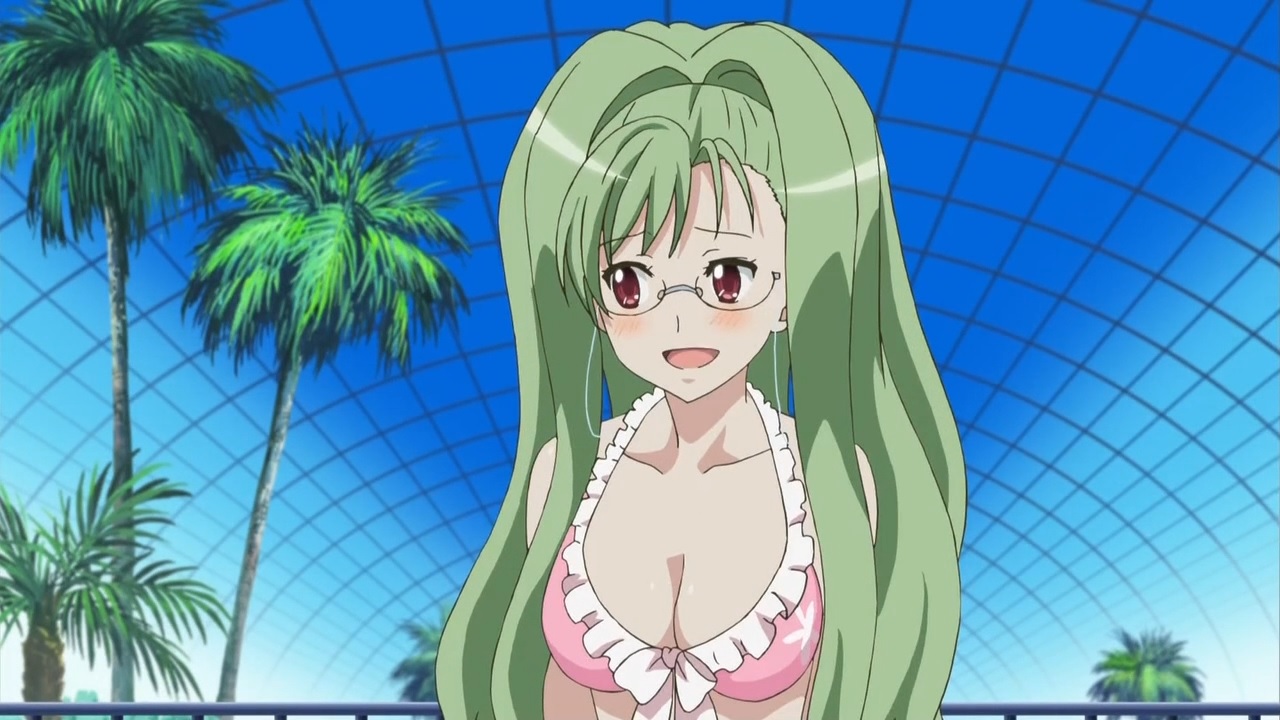
"I didn't know what kind of swimsuit I should wear... It's all right to laugh." (19:07)
The Japanese line is "Watashi, dou iu no wo kitara ii no ka wakaranakute... Warau to ii wa" (私、どういうのを着たらいいのか分からなくて・・・笑うといいわ). This is referencing a set of lines said by Ayanami Rei and Ikari Shinji in episode 6 of "Neon Genesis Evangelion" (新世紀エヴァンゲリオン), an anime series that aired from 1995 to 1996.S2 Their lines go as follows:
レイ: 「ごめんなさい。こういうときどんな顔をすればいいのか分からないの。」To elaborate, in Japanese, the term "warau" (笑う) can mean "to laugh" as well as "to smile".
シンジ: 「笑えばいいと思うよ。」
Rei: "Gomennasai. Kou iu toki donna kao wo sureba ii no ka wakaranai no."
Shinji: "Waraeba ii to omou yo."
Rei: "I'm sorry. At a time like this, I don't know what kind of expression I should have."
Shinji: "I think it's all right to smile."
Video of the scene for reference: https://youtube.com/watch?v=GdbSlAuOUCM
(19:21 - 19:37)
The lines at this time go as follows.
ニャル子: 「クー子!私以外に主役なんてどこにもいません!邪神すべてが脇役なんです!あんたもハスター君も脇役なんです!」This is referencing a set of lines said by Heero Yui (ヒイロ・ユイ) and Zechs Merquise (ゼクス・マーキス) in episode 49 of "Mobile Suit Gundam Wing" (新機動戦記ガンダムW), an anime series that aired from 1995 to 1996.S2 The original lines go as follows:
クー子: 「わたしはまだ、自分を脇役と認めたわけじゃない」
Nyaruko: "Kuuko! Watashi igai ni shuyaku nante doko ni mo imasen! Jashin subete ga wakiyaku nan desu! Anta mo Hasutaa-kun mo wakiyaku nan desu!"
Kuuko: "Watashi ha mada, jibun wo wakiyaku to mitometa wake ja nai"
Nyaruko: "Cthuko! Except for me, no one is a leading role! All evil gods are supporting roles! You and Hasta are both supporting roles!"
Cthuko: "I still don't acknowledge myself as a supporting role."
ヒイロ: 「ゼクス、強者などどこにもいない!人類すべてが弱者なんだ!俺もお前も弱者なんだ!」
ゼクス: 「私はまだ、自分を弱者と認めていない!」
Hiiro: "Zekusu, kyousha nado doko ni mo inai! Jinrui subete ga jakusha nan da! Ore mo omae mo jakusha nan da!"
Zekusu: "Watashi ha mada, jibun wo jakusha to mitometeinai!"
Heero: "Zechs, no one is strong! All of humanity is weak! You and I are both weak!"
Zechs: "I still don't acknowledge myself as one of the weak!"
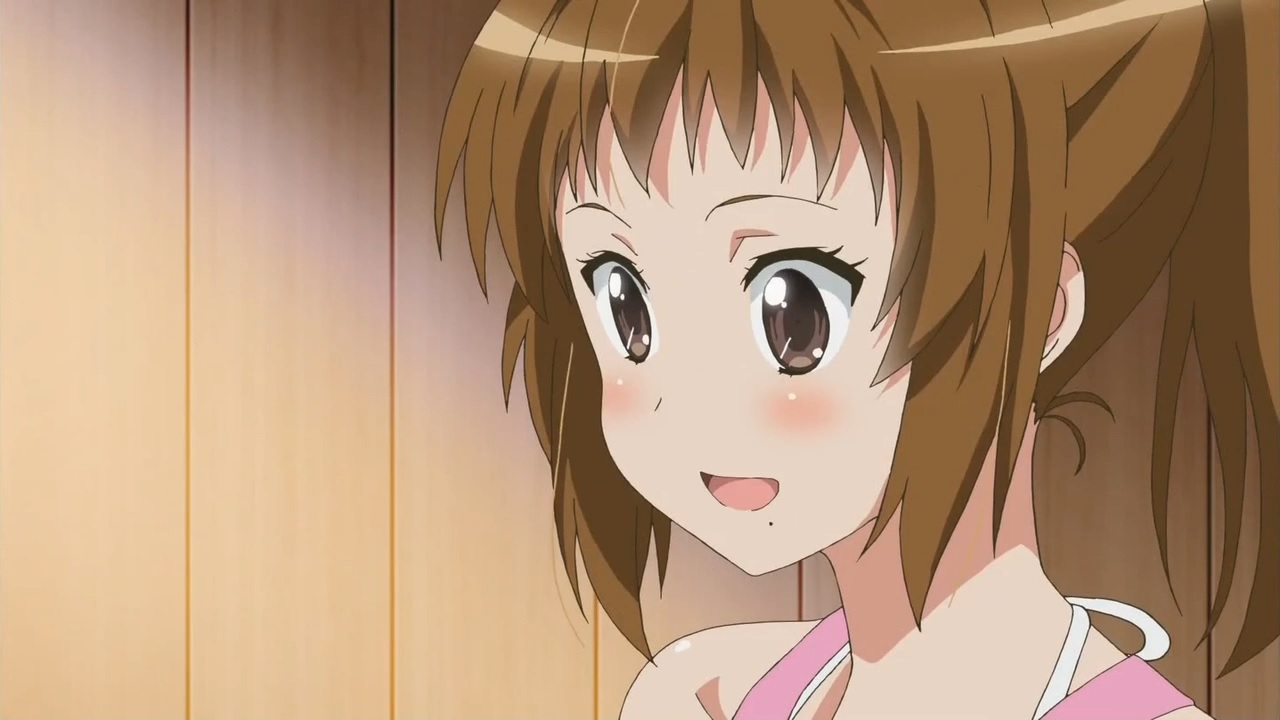
(19:43)
The line at this time goes as follows:
「だけど気になる。甘くて苦いマーマレードなボーイ、かな。」This is referencing lines in the lyrics to "Egao ni Aitai" (笑顔に会いたい), "I Want to See Your Smile", a song sung by Yuzuki Miyu (柚木美祐) and released in 1994. This song is the opening theme song for "Marmalade Boy" (ママレード・ボーイ), an anime series that aired from 1994 to 1995.S2 The original lines go as follows:
"Dakedo ki ni naru. Amakute nigai maamareedo na booi, ka na."
"However, I'm curious about the sweet and bitter marmalade boy."
「だけど気になる」
「甘くて苦いママレード」
"Dakedo ki ni naru"
"Amakute nigai mamareedo"
"However, I'm curious"
"Sweet and bitter marmalade"
(20:34 - 20:47)
The lines at this time go as follows.
ニャル子: 「クー子、私は涙を流しませんよ。這いよる混沌だから。邪神がから!」This is referencing lines in the lyrics to "Ore ha Gureeto Majingaa" (おれはグレートマジンガー), "I am the Great Mazinger", a song sung by Mizuki Ichirou (水木一郎) and released in 1974. This song is the opening theme song for "Gureeto Majingaa" (グレートマジンガー), "Great Mazinger", an anime series that aired from 1974 to 1975.S2 The original lines go as follows.
クー子: 「燃える欲情でニャル子のハートを撃つ!」
ニャル子: 「ダッシュ、ダッシュ、ダンダンダダン!」
クー子: 「悪いニャル子をぶちのめす!」
Nyaruko: "Kuuko, watashi ha namida wo nagashimasen yo. Haiyoru konton da kara. Jashin da kara!"
Kuuko: "Moeru yokujou de Nyaruko no haato wo utsu!"
Nyaruko: "Dasshu, dasshu, dan dan da dan!"
Kuuko: "Warui Nyaruko wo buchinomesu!"
Nyaruko: "Cthuko, I will not cry. Because I'm the Crawling Chaos. Because I'm an evil god!"
Cthuko: "With burning passion, I'll shoot down Nyaruko's heart!"
Nyaruko: "Dash, dash, dan dan da dan!"
Cthuko: "I'll beat up the bad Nyaruko!"
「おれは涙を流さない」
「ロボットだから マシーンだから」
「だけどわかるぜ 燃える友情」
「きみといっしょに 悪をうつ」
「悪いやつらをぶちのめす」
「ダッシュ ダッシュ ダンダン ダ ダン」
"Ore ha namida wo nagasanai"
"Robotto dakara mashiin dakara"
"Dakedo wakaru ze moeru yuujou"
"Kimi to issho ni aku wo utsu"
"Warui yatsura wo buchinomesu"
"Dasshu dasshu dan dan da dan!"
"I will not cry"
"Because I'm a robot, because I'm a machine"
"But I understand, burning friendship"
"Together with you, we will shoot down evil"
"We will beat up the bad guys"
"Dash! Dash! Dan dan da dan!"
"Evil God Go!" (20:48)
The Japanese line is "Jashin Goo!" (邪神ゴー!). This is referencing a catch phrase said by Kouji Kabuto (兜甲児) in "Majingaa Z" (マジンガーZ), "Mazinger Z", a manga series written by Nagai Gou (永井豪) and published from 1972 to 1974.S2 His line goes, "Majin Goo!" (マジンゴー!), which translates to "Mazin Go!".
"Kecha Wacha!" (21:00)
"Kecha Wacha" (ケチャワチャ) is the name of a monster that appears in "Monster Hunter 4" (モンスターハンター 4), a video game released by CAPCOM (カプコン) in 2013.S2
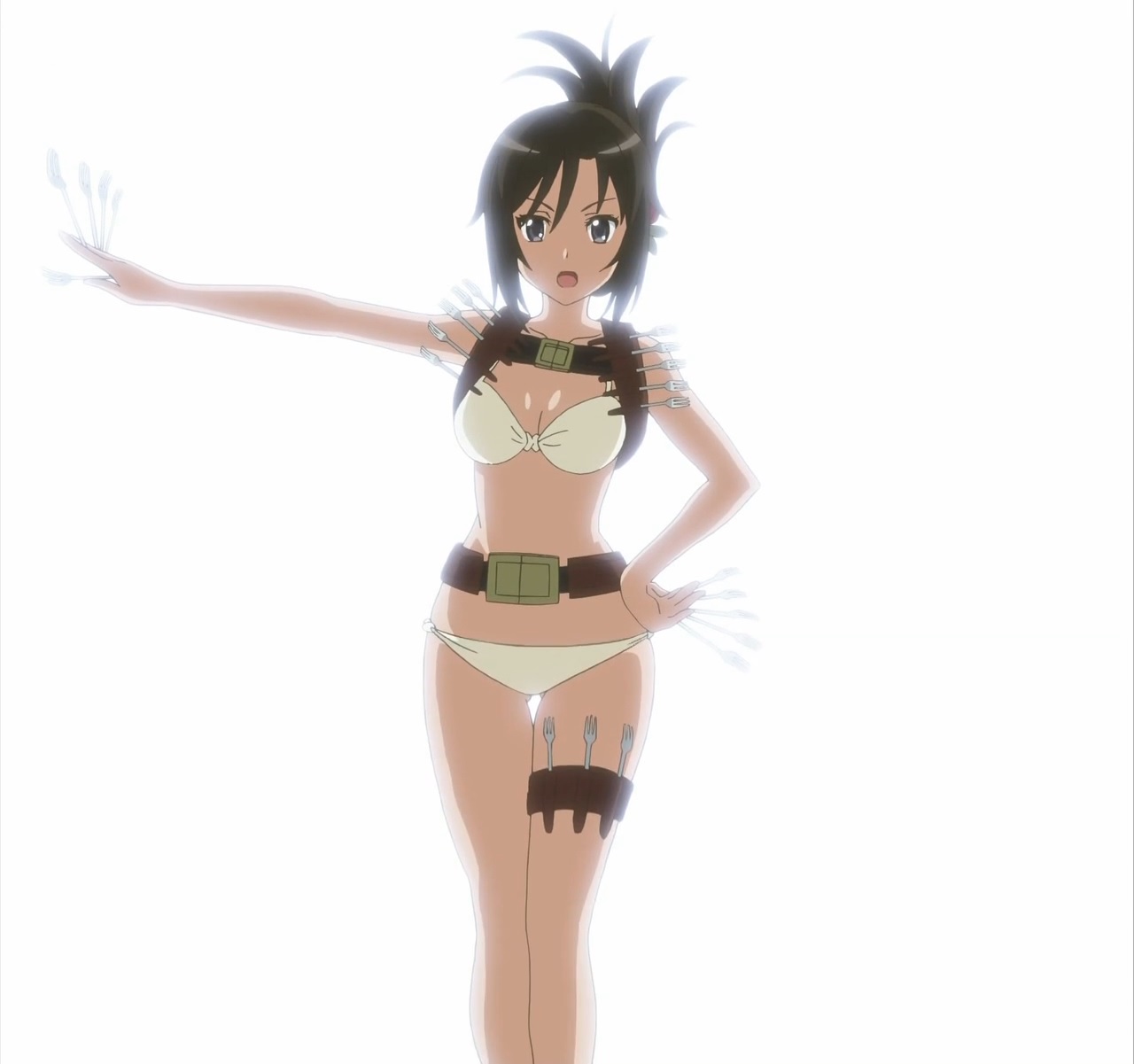
(21:04)
There are two references here:
* The line at this time goes as follows:
「天が呼ぶ!地が呼ぶ!ヒロくんが呼ぶ!」This is referencing a catch phrase said by Kamen Rider Stronger in "Kamen Rider Stronger" (仮面ライダーストロンガー), a Japanese TV show about a masked super hero that aired in 1975.S1 His line, with variations, goes as follows:
"Ten ga yobu! Chi ga yobu! Hiro-kun ga yobu!"
"The heavens call! The Earth calls! Hiro calls!"
「天が呼ぶ!地が呼ぶ!人が呼ぶ!悪を倒せと俺を呼ぶ!俺は正義の戦士、仮面ライダーストロンガー!」* Yoriko's appearance, with forks strapped to her shoulders and left leg, is referencing the appearance of Kamen Rider Eternal (仮面ライダーエターナル) in "Kamen Raidaa W FOREVER A to Z / Unmei no Gaia Memori" (仮面ライダーW FOREVER AtoZ/運命のガイアメモリ), "Kamen Rider W FOREVER A to Z / The Gaia Memories of Fate", a movie about a masked super hero that was released in 2010. The movie centers around 26 Gaia Memories, devices shaped like USB drives that grant special abilities. In the climax of the movie, Kamen Rider Eternal equips all 26 of these Gaia Memories at the same time to straps on his shoulders, right arm, and left leg. Images for reference:
"Ten ga yobu! Chi ga yobu! Hito ga yobu! Aku wo taose to ore wo yobu! Ore ha seigi no senshi, Kamen Raidaa Sutorongaa!"
"The heavens call! The Earth calls! The people call! They call for me to defeat evil! I'm the warrior of justice, Kamen Rider Stronger!"
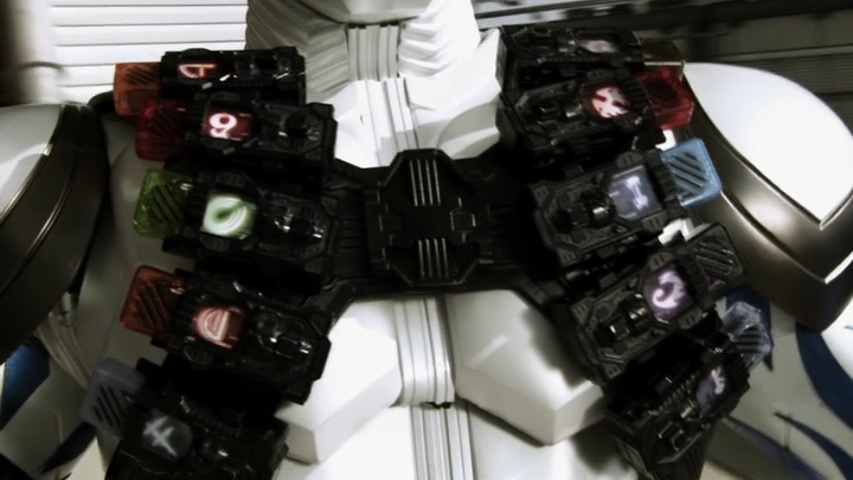
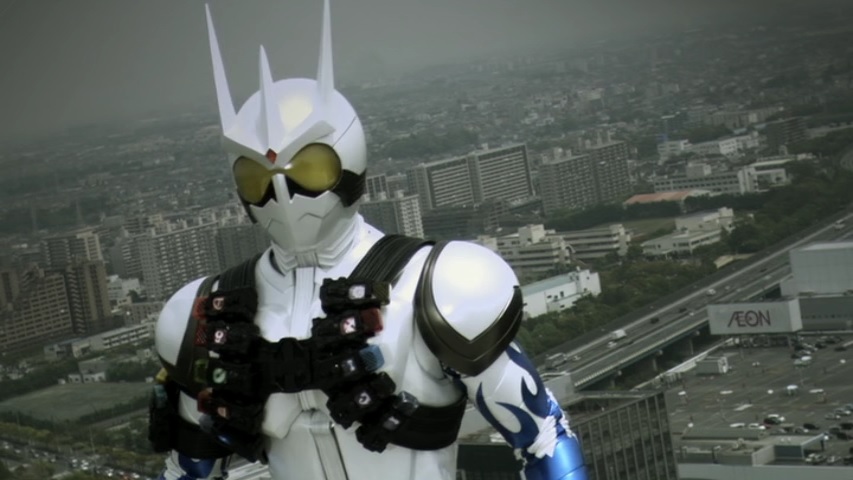
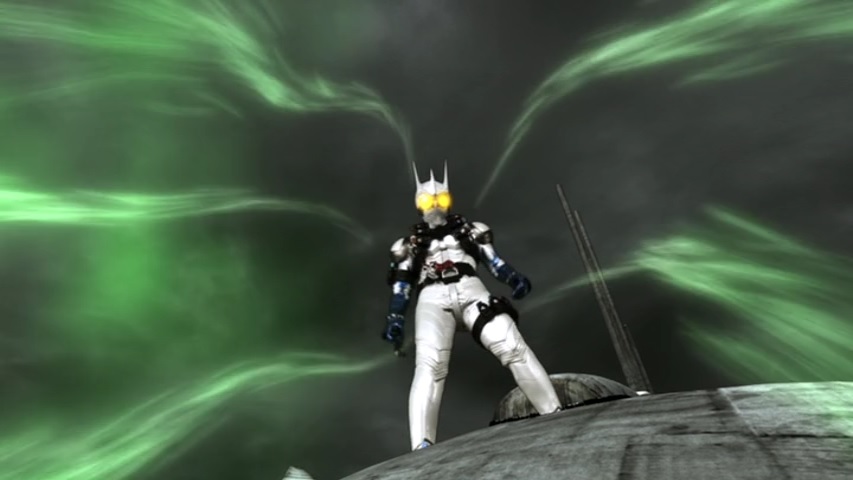
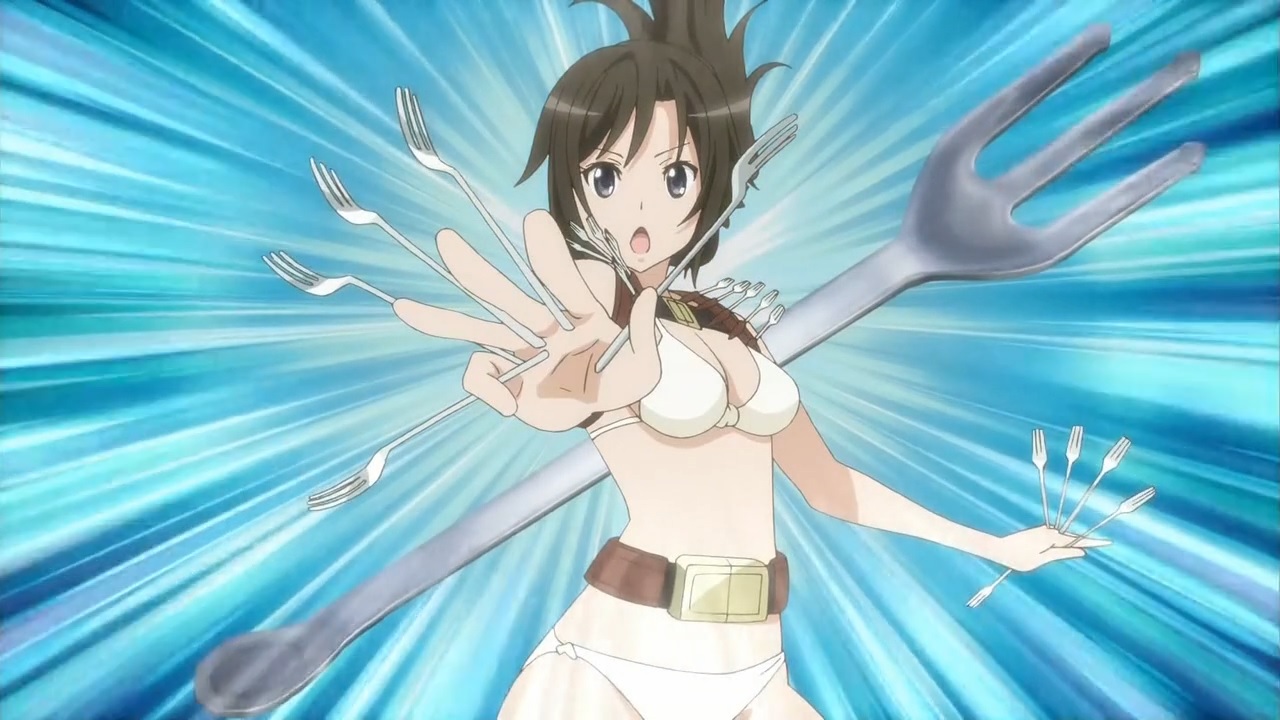
"Shall I have you douse yourself in water and repent?" (21:23)
The Japanese line is "Mizu demo kabutte, hansei shite moraou kashira?" (水でもかぶって、反省してもらおうかしら?). This is referencing a catch phrase said by Sailor Mercury (セーラーマーキュリー) in "Bishoujo Senshi Seeraa Muun" (美少女戦士セーラームーン), "Pretty Guardian Sailor Moon", an anime series that aired from 1992 to 1993. Her line goes, "Mizu demo kabutte hansei shinasai!" (水でもかぶって反省しなさい!), which translates to "Douse yourself in water and repent!". On a related note, the voice actor who voices Sailor Mercury, Hisakawa Aya (久川綾), also voices Yoriko.S2
(21:33)
The line at this time goes as follows:
「これは全部太陽のせい!」This is referencing "L'Étranger", a French novella written by Albert Camus and published in 1942.S2 The novella was first translated into English by Stuart Gilbert with the title "The Stranger" and published in 1946. The novella was first translated into Japanese by Kubota Keisaku (窪田啓作) with the title "Ihoujin" (異邦人) and published in 1951. In the novella, the main character and narrator, Meursault, is put on trial for killing a man. At one point during the trial, the presiding judge asks Meursault to explain what were the motives of his crime, and Meursault narrates the following:
"Kore ha zenbu taiyou no sei!"
"This is all because of the sun!"
"J’ai dit rapidement, en mêlant un peu les mots et en me rendant compte de mon ridicule, que c’était à cause du soleil. Il y a eu des rires dans la salle." (original text)
「私は、早口にすこし言葉をもつれさせながら、そして、自分の滑稽さを承知しつつ、それは太陽のせいだ、といった。廷内に笑い声があがった。」 (窪田啓作訳)
"Watashi ha, hayakuchi ni sukoshi kotoba wo motsure sase nagara, soshite, jibun no kokkeisa wo shouchi shi tsutsu, sore ha taiyou no sei da, to itta. Teinai ni waraigoe ga agatta." (Kubota Keisaku translation)
"I tried to explain that it was because of the sun, but I spoke too quickly and ran my words into each other. I was only too conscious that it sounded nonsensical, and, in fact, I heard people tittering." (Gilbert translation)
(21:36)
The line at this time goes as follows:
「ヒロくんとはね、フォークの数が違うの。26本どこまで耐えられるかな?!」There are two references here:
"Hiro-kun to ha ne, fooku no kazu ga chigau no. Nijuuroppon doko made taerareru ka na?!"
"I have more forks than Hiro. How many of these 26 can you endure?!"
* This is referencing a line said by Kamen Rider Eternal (仮面ライダーエターナル) in "Kamen Raidaa W FOREVER A to Z / Unmei no Gaia Memori" (仮面ライダーW FOREVER AtoZ/運命のガイアメモリ), "Kamen Rider W FOREVER A to Z / The Gaia Memories of Fate", a movie about a masked super hero that was released in 2010. His line is "Memorii no kazu ga chigau. Owari da!" (メモリーの数が違う。終わりだ!), which translates to "I have more memories than you. This is the end!".
* The number 26 is referencing the 26 Gaia Memories, devices shaped like USB drives that grant special abilities, that appear in the movie. Kamen Rider Eternal equips all 26 of these devices at the same time when he says the above line.
"Goa Magara!" (21:44)
"Goa Magara" (ゴア・マガラ) is the name of a monster that appears in "Monster Hunter 4" (モンスターハンター 4), a video game released by CAPCOM (カプコン) in 2013.S1
(21:58)
The line at this time goes as follows:
「暑苦しいですね、ここ。おーい、開けてくださいよ。」This is referencing a line said by Kamille Bidan (カミーユ・ビダン) in episode 50 of "Mobile Suit Zeta Gundam" (機動戦士Ζガンダム), an anime series that aired from 1985 to 1986. His original line goes as follows:
"Atsukurushii desu ne, koko. Ooi, akete kudasai yo."
"It's really hot in here. Hey, please open up."
「暑苦しいな、ここ。出られないのかな?おーい!出してくださいよ!ねぇ!」
"Atsukurushii na, koko. Derarenai no ka na? Ooi! Dashite kudasai yo! Nee!"
"It's really hot in here. Is there no way out? Hey! Please get me out of here! Hey!"
"I'm sorry, I'm sorry, I'm sorry" (22:03)
Cthuko repeatedly says, "Gomennasai" (ごめんなさい). This is referencing a scene in which Ryuuguu Rena (竜宮レナ) repeatedly says the same thing in "Higurashi no Naku Koro ni" (ひぐらしのなく頃に), "When They Cry", a series of sound novels that was released from 2002 to 2006.S2 This same scene was depicted in episode 4 of the anime adaptation that aired in 2006.
"Next time there will be a new field called the Ancestral Steppe." (22:25)
The Japanese line is "Kondo, iseki heigen tte atarashii fiirudo ga dekiru n da tte" (今度、遺跡平原って新しいフィールドが出来るんだって). "Iseki heigen" (遺跡平原), "Ancestral Steppe", is referencing a location that appears in "Monster Hunter 4" (モンスターハンター 4), a video game released by CAPCOM (カプコン) in 2013.S2 The mention of "kondo" (今度), "next time", is likely referencing how at the time of airing of episode 7 of "Haiyore! Nyaruko-san W" on May 26, 2013, "Monster Hunter 4" had not been released yet and was the next game in the "Monster Hunter" series planned to be released. The game was released later that year on September 14, 2013.
(24:10)
The line at this time goes as follows:
「広い宇宙の、青い地球で、時に激しく時に切なく」This is referencing lines in the lyrics to "Chiisana Koi no Uta" (小さな恋のうた), "Little Love Song", a song performed by MONGOL800 and released in 2001.S2 The original lines go as follows:
"Hiroi uchuu no, aoi chikyuu de, toki ni hageshiku toki ni setsunaku"
"In the vast universe on the blue Earth, at times intense, at times painful"
「広い宇宙の数ある一つ」
「青い地球の広い世界で」
「時に激しく時に切なく」
"Hiroi uchuu no kazu aru hitotsu"
"Aoi chikyuu no hiroi sekai de"
"Toki ni hageshiku toki ni setsunaku"
"Of the many in the vast universe there is just one"
"In the vast world of the blue Earth"
"At times intense, at times painful"
(24:15)
The line at this time goes as follows:
「二人がトロッコに乗って逃げていく先はきっと地獄なんだわ」This is referencing lines in the lyrics to "Chiisana Koi no Merodi" (小さな恋のメロディ), "Little Love Melody", a song performed by Kinniku Shoujo Tai (筋肉少女帯) and released in 1997.S2 This song is the opening theme song for Eat-Man (イートマン), an anime series that aired in 1997. The original lines go as follows:
"Futari ga torokko ni notte nigete iku saki ha kitto jigoku nan da wa"
"The trolley that the two escaped in is surely heading to hell"
「ねえ二人はさぁ トロッコに乗って逃げてくの ラストシーン」
「あの二人が」 「どこへ行ったか」 「あなた わかる?」
「きっと地獄なんだわ」
"Nee futari ha saa torokko ni notte nigeteku no rasuto sheen"
"ano futari ga" "doko he itta ka" "anata wakaru?"
"kitto jigoku nan da wa"
"The last scene of the two escaping in the trolley"
"Do you know where the two went?"
"Surely hell"
"That's not what happens at all." (24:20)
The Japanese line is "tte iu hanashi de ha arimasen ga" (っていう話ではありませんが). This is referencing "guda guda feariizu" (gdgd妖精s), "Gdgd Fairies", an anime series that aired in 2011.S2 This line is referencing how during the next episode preview for "Gdgd Fairies" the narration describes a development that happens in the next episode, and then concludes by stating, "tte iu hanashi de ha arimasen ga, otanoshimi ni!" (っていう話ではありませんが、お楽しみに!), which translates to "That's not what happens at all, but please look forward to it!".
The broadcast of episode 7 was delayed by one week due to the broadcast of the 2013 World Table Tennis Championships. On May 12, 2013, the official anime website for "Haiyore! Nyaruko-san", http://nyaruko.com/, appeared as follows:
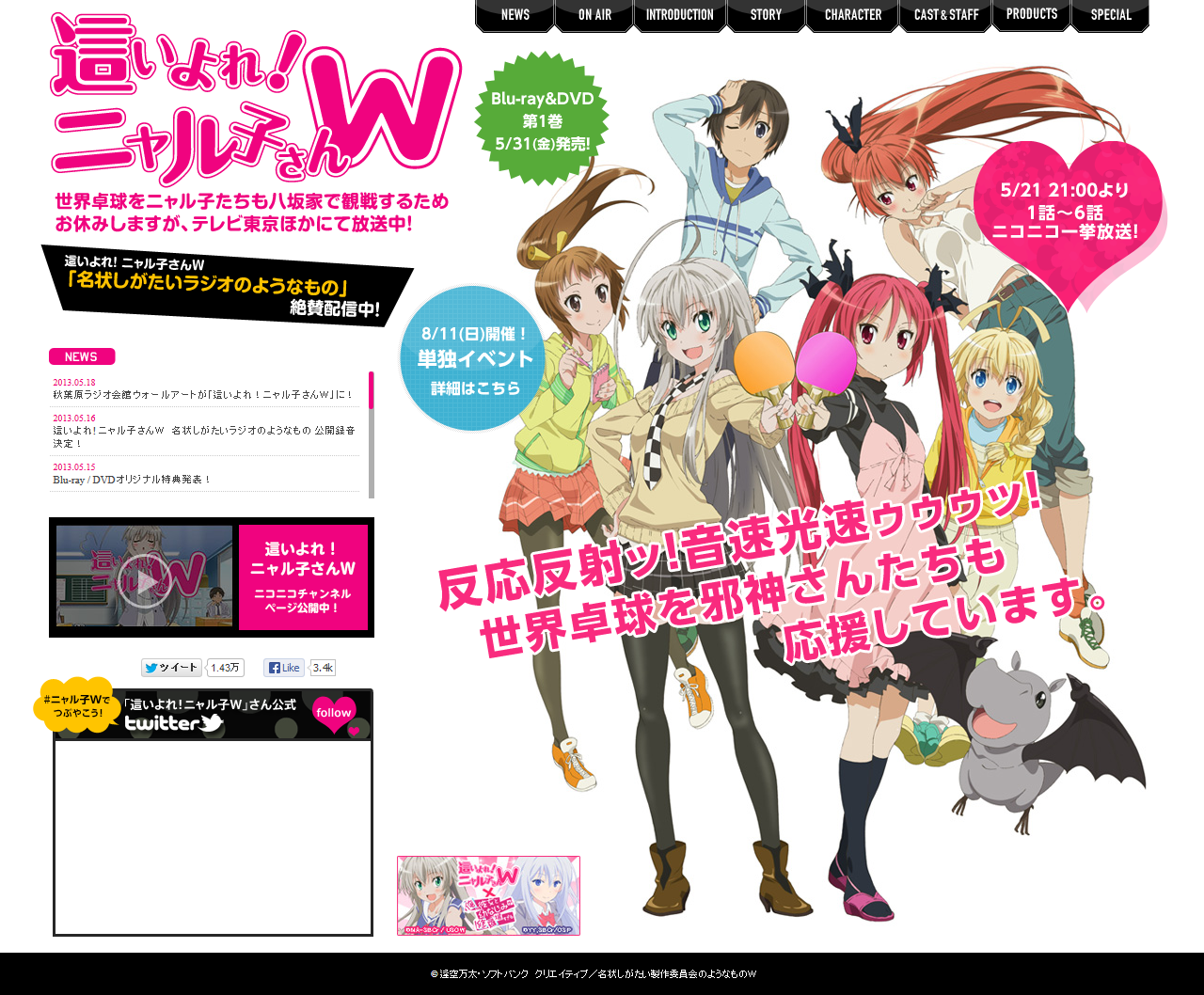
Main image
This is the main text that appeared on the page:

The main text goes as follows:
反応反射ッ!音速光速ゥゥゥッ!世界卓球を邪神さんたちも応援してます。The phrase "Hannou hansha! Onsoku kousokuuuu!" (反応反射ッ!音速光速ゥゥゥッ!), "Reaction reflection! Speed of sound speed of light!", is referencing a line said by Hoshino Yutaka (星野裕), also known as Peko (ペコ), in chapter 48 in volume 5 of "Ping Pong" (ピンポン), a manga series written by Matsumoto Taiyou (松本大洋) and published from 1996 to 1997. His line goes, "Hannou! Hansha... Onsoku! Kousoku!" (反応!反射・・・音速!光速!), which translates to "Reaction! Reflection... Speed of sound! Speed of light!". Image for reference:
"Hannou hansha! Onsoku kousokuuuu! Sekai Takkyuu wo jashin tachi mo ouen shitemasu."
"Reaction reflection! Speed of sound speed of light! The evil gods are also supporting the World Table Tennis Championships."
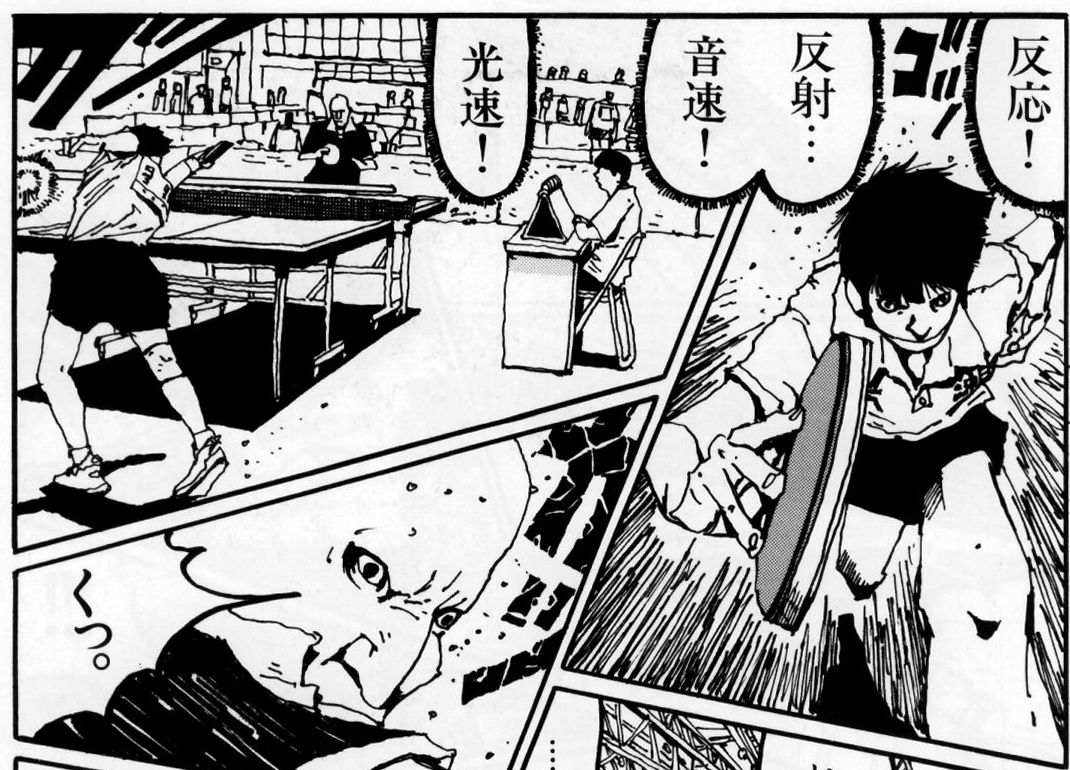
List of Sources:
S1. Comments on this post
S2. A post at Steman Blog (ステマブログ)
S3. A blog by servitors about Cthulhu Mythos inspired works (クトゥルー/クトゥルフ神話作品発掘記)
Thanks to everyone who contributed! This list wouldn't be nearly as long without you all. See you next episode!
情報を教えてくださって本当にありがとうございました!皆さんがいなかったら、このリストはぜんぜん長くありません。またこの次までね!
Last updated February 21, 2022
Sitemap
Home